Archive of Events
BREM Seminar
Deportation of Migrants in Chile: Ambivalences and Competing Rationalities
Roberto Dufraix, University of Chile
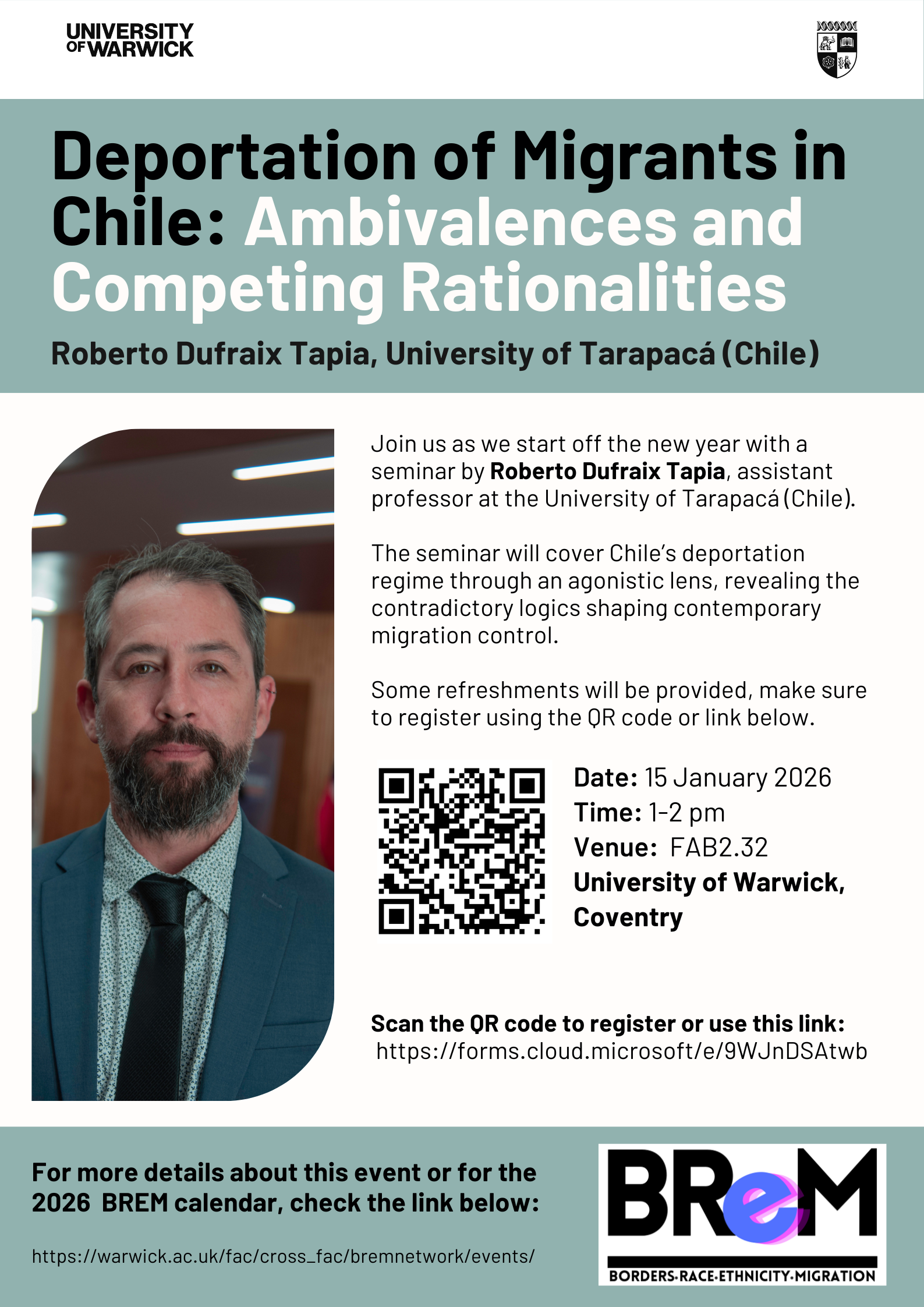
Date:15 January2026
Venue: FAB 2.32
Time: 1-2pm
In Chile, human mobility was regulated until 2022 by the legal framework designed during Pinochet’s dictatorship (Decree Law No. 1,094 of 1975). Within this framework, the literature has shown that the narratives and practices of control agencies have been permeated by authoritarian logics and that the instruments deployed to address crimes committed by foreign nationals do not always align with the ethos of the crimmigration thesis.
Building on this, the presentation analyzes the deportation regime in the Chilean case from an agonistic perspective (Goodman, Page, and Phelps, 2017), an approach that allows for the interpretation of shifts in mobility-control mechanisms and devices as the product of competing logics and rationalities, yielding ambivalent and contradictory control regimes.
Book Talk
Race and the Question of Palestine
Lana Tatour, University of New South Wales

Date: 4 December2025
Venue: S0.11
Time: 5-7pm
Speaker: Lana Tatour, University of New South Wales, presenting her newly published co-edited book (Stanford University Press, 2025)
Organised by: Centre for Critical Legal Studies, Social Theory Centre, and Borders, Race, Ethnicity and Migration Network
Join us for a timely and incisive conversation with author Lana Tatour, in dialogue with Nicola Pratt (PAIS) and Goldie Osuri (Sociology), on her recently published edited volume Race and the Question of Palestine (Stanford University Press, 2025, co-edited with Ronit Lentin). This groundbreaking collection argues that the colonization of Palestine is inseparable from the global histories and logics of race, and it places Palestine at the heart of conversations about imperialism, settler colonialism, capitalism, and heteropatriarchy.
The event will delve into the rich and often-overlooked tradition of theorizing race within Palestine studies; the entanglements of race and international law; the politics and practice of racialization; and the structures and everyday expressions of anti-Palestinian racism. It will also speak to the urgency of the present moment, addressing how these frameworks help us understand Israel’s ongoing violence in Gaza and the wider global landscape of solidarity, resistance and struggle.
This event will be of particular interest to those working in Middle East studies, critical race theory, anti-colonial and feminist thought, international law, and anyone seeking sharper conceptual tools for understanding both the history and the contemporary politics of Palestine.
BREM Migration Scholars Solidarity and Resistance Teach-in/Teach-out
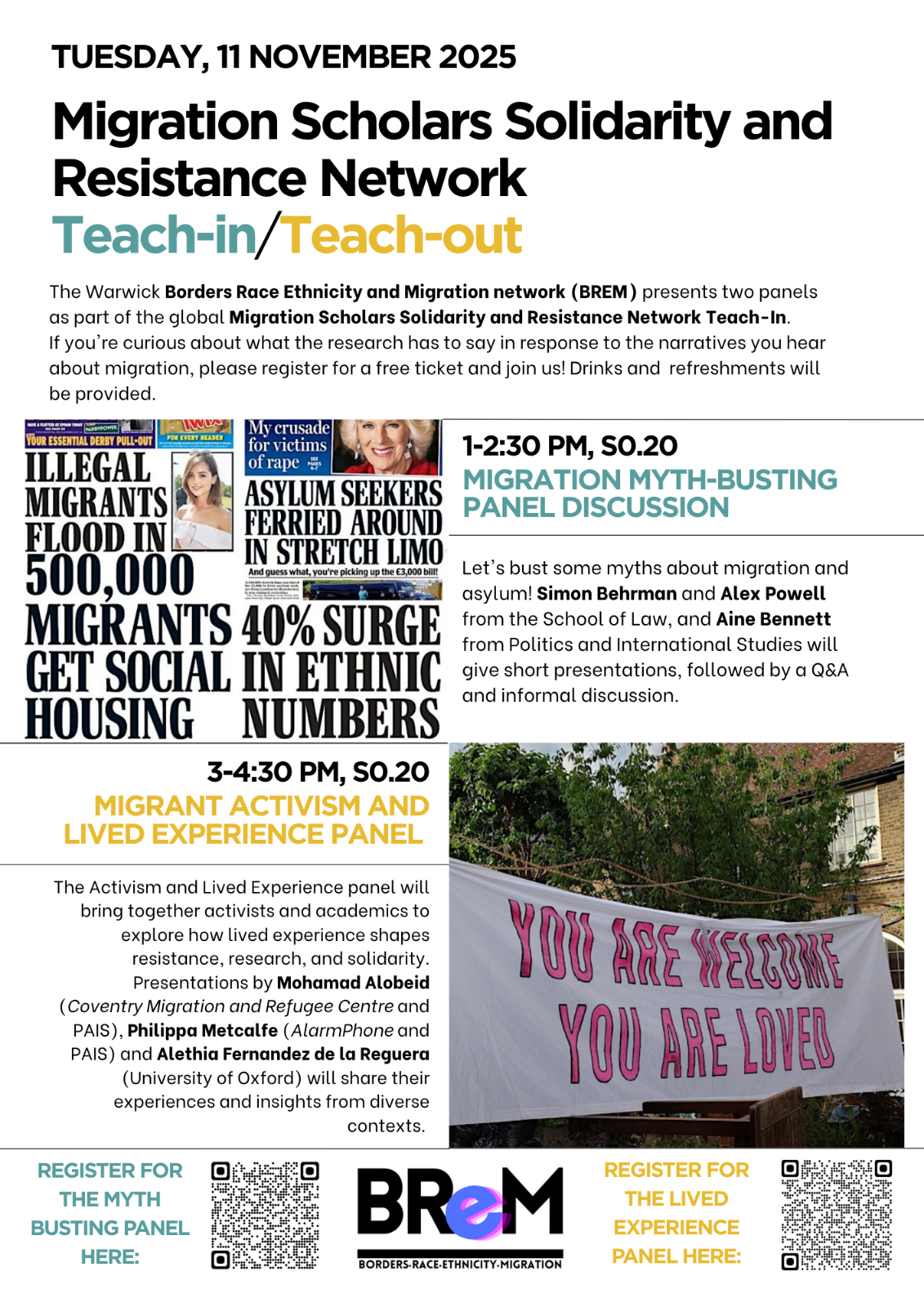
Date: 11 November 2025
Venue: S0.20
Time :1-4:30pm
On 11/11 the Warwick Borders Race Ethnicity and Migration network presents two panels as part of the global Migration Scholars Solidarity and Resistance Network Teach-In. If you're curious about what the research has to say in response to the narratives you hear about migration, please register for a free ticket and join us! All are welcome and attendance is free. Refreshments will be provided during the break from 2.30-3pm and both events will be held at Warwick in the Social Sciences Building, Room S0.20. You can join one or both of the panels and– please sign up at the links below!
1-2.30pm: Myth-busting panel
Let's bust some myths about migration and asylum! Simon Behrman and Alex Powell from the School of Law, and Aine Bennett from Politics and International Studies will give short presentations, followed by a Q&A and informal discussion.
3-4.30pm: Activism and Lived Experience panel
It will bring together activists and academics to explore how lived experience shapes resistance, research, and solidarity. Presentations by Mohamad Alobeid (Coventry Migration and Refugee Centre and PAIS), Philippa Metcalfe (AlarmPhone and PAIS) and Alethia Fernandez de la Reguera (University of Oxford) will share their experiences and insights from diverse contexts.
BREM Annual Lecture 2025/26
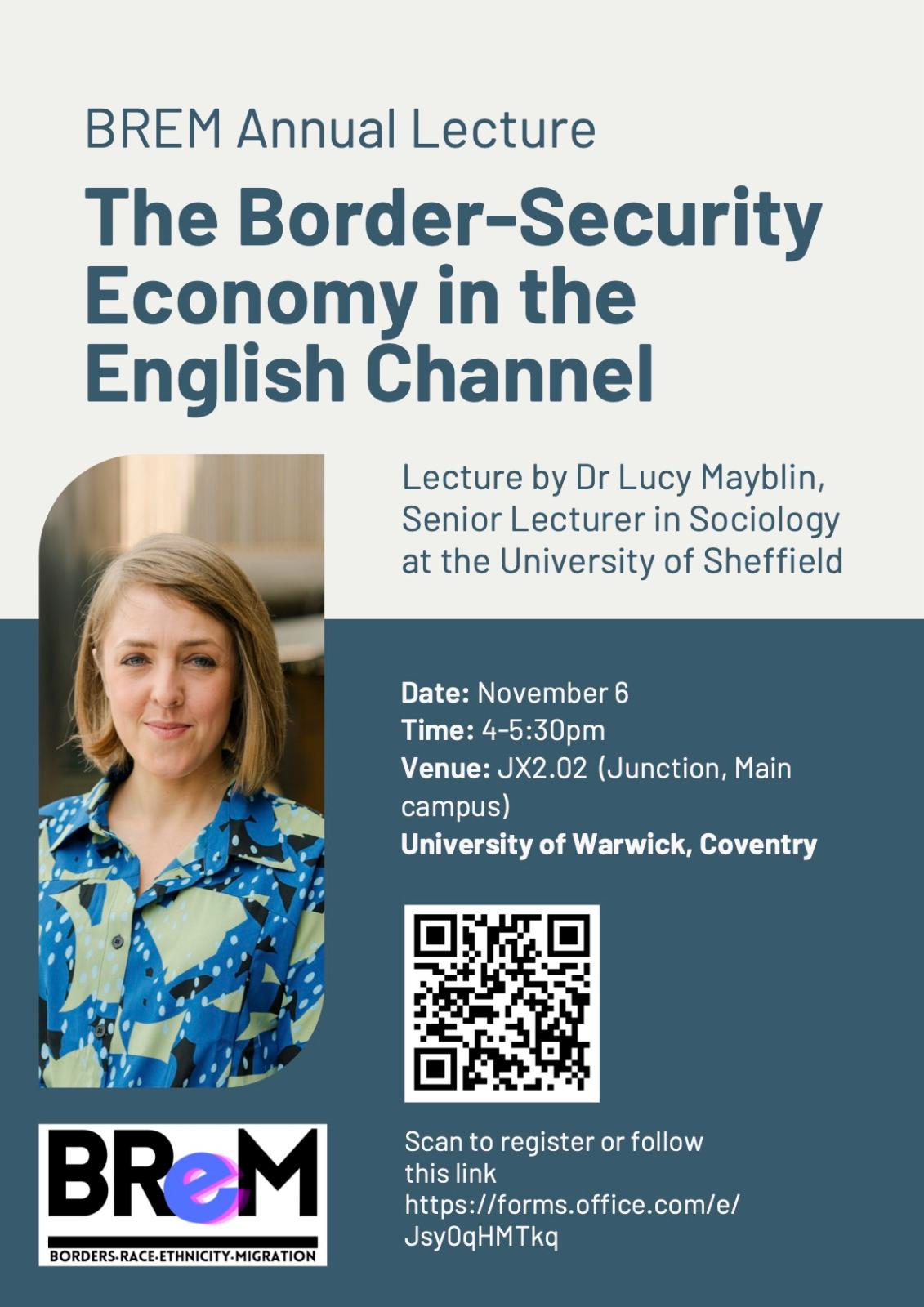
Date: 6 November 2025
Venue: JX2.02 (Junction, Main Campus)
Time: 4-5:30pm
About the talk:The movement of people in small boats across the English Channel to claim asylum has created a policy and media spectacle in the UK. This talk examines the bordering infrastructure along the Northern French Coast and in the UK which have shaped these criminalised journeys. It does so by focussing on the political economy of bordering and the wider global and social interests that shape the border-security economy. Whilst it is fairly well established that coercive policing, surveillance, and the fortification of ports such as Calais, have directed people towards maritime routes in the Channel, what is less developed is an understanding of whose interests are served by these strategies. Drawing on conceptualisations of racial capitalism, this talk thus asks: in whose material and symbolic interests do borders such as this work?
About the Speaker:
Dr Lucy Mayblin is Senior Lecturer in Sociology at the University of Sheffield. Her research focuses on asylum, human rights, policy-making, and the legacies of colonialism. She is author of three books:Asylum After Empire(2017),Impoverishment and Asylum(2019),Migration Studies and Colonialism(with Joe Turner, 2021), and co-edited the collectionPostcoloniality and Forced Migration(2022) and theSage Handbook of Global Sociology(2023). She is currently working on an ESRC funded project on UK government response to small boats Channel crossings with Arshad Isakjee, Thom Davies, Joe Turner and Tesfalem Yemane.
ONLINE TALK: MATERIALIZATION OF AGENCY. ASYLUM SEEKERS’ HIDEOUTS ON THE POLISH-BELARUSIAN BORDER

BREM ANNUAL LECTURE: MOCKING THE BORDER - CARNIVALESQUE RESISTANCE IN TIMES OF MIGRATION
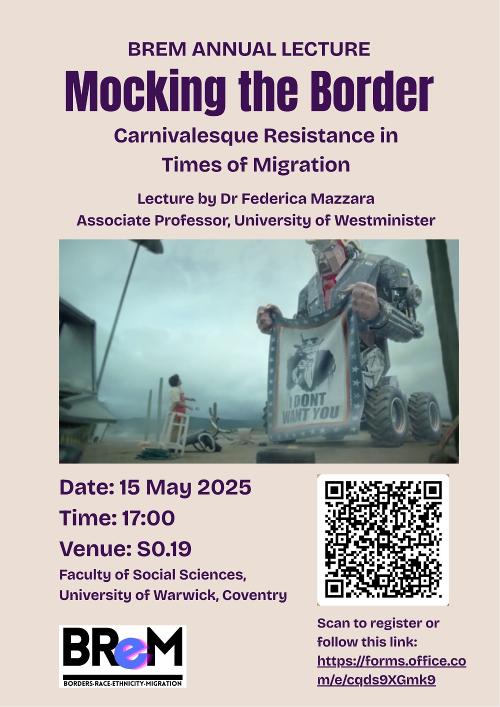
PGR WORK-IN-PROGRESS SESSION
May 15th, 2025 13:00-17:00, FAB6.04
We are pleased to invite PGRs to participate in a work-in-progress session on 15 May 2025 (1300-1800h), where Dr Niharika Pandit (Lecturer, Queen Mary University of London) and Dr Federica Mazzara (Reader, University of Westminster) will join us as discussants, providing feedback on draft papers, chapters, or research in progress.
We welcome proposals from PGRs at all levels who are interested in presenting their work along one or more of the interconnected themes of borders, race, ethnicity and migration. Each presentation will be 10-15 minutes and will be followed by 10-15 minutes of feedback from the readers with an interactive audience discussion. Please note we have limited presentation spaces so please get in touch asap if this would be of interest. We want this to be a collaborative, informal, and inclusive session, which is designed to foster dialogue and constructive critique. To ensure meaningful engagement, we encourage presenters to share their draft papers in advance so that readers and participants can provide more informed feedback.
The workshop will also be open to participants who do not want to present, and the PGR session will also include a workshop by Dr Pandit on feminist anti-colonial and anti-imperialist praxis. There will also be a lecture by Dr Mazzara, which is open to everyone. More information on these will follow soon.
If you would like to present, please email your presentation title and abstract (max 300-350 words) to raksha.gopal@warwick.ac.uk by 7 April 2025.
INCREASED ACCESS TO HIGHER EDUCATION FOR REFUGEES AND ASYLUM SEEKERS - Presentation of the Getting Ahead Project
May 8th, 2025, 13:00 - 14:00, FAB1.11

Abstract
Of the 117.3 million people who have experienced forcible displacement worldwide, only 7% have access to higher education (UNHCR, 2023). And whilst this is a sevenfold increase from enrolment rates in 2019, it is a far cry from the 15% enrolment target rate set for 2030 by the UN Refugee Agency, and from the current average enrolment rates for non-refugees, which stand at 42% (UNHCR, 2023). Faced with the hard facts of this educational crisis, how might higher education practitioners respond?
Three miles from the University of Warwick campus stand a series of buildings where refugees and asylum seekers are temporarily housed. Barriers to accessing higher education accumulate along those three miles so that for most who reside in those buildings, the journey to university will prove insurmountable. This presentation will showcase the ongoing work of the Getting AHEAD project (Access to Higher Education and Academic Development), which is funded by the Enhancing Research Culture Fund. Our aim with this project is to demonstrate how impactful and sustainable pathways into higher education for displaced individuals can be created when research-driven insights into localised barriers to access are mitigated by practical initiatives that make use of preexisting university resources: the subject specialisms of academics, the mentorship of current university students, and campus itself.
Building on the legacy of the initial ERC-funded phase of this work (21/2), the Getting AHEAD project sought to directly address one of the most prevalent known barriers to accessing HE for Coventry-based refugees and asylum seekers. In 2025, we conducted the research-driven design and implementation of ‘an on-campus [pilot] course to provide advanced English language support, including on academic study skills, for refugee and asylum-seeking young people with higher levels of language skills’ in Coventry (Ashlee, Clayton & Hmmed, 2022). In this presentation, we will share our proposed blueprint for an inclusive ‘Access to HE’ course design that can be delivered by any academic in any department, and discuss the benefits of implementing a participatory and community-led approach to refugee education research.
Presenters
Dr Ursula Clayton is Assistant Professor in Early Modern and Shakespeare Studies (Teaching-Focused) in the Department of English and Comparative Literary Studies, at the University of Warwick. Ursula is the Project Lead for the Getting AHEAD Project.
Dr Alice Robinson is Senior Research Manager at the educational charity Refugee Education UK. Alice is a Research Consultant for the Getting AHEAD Project.
Sam Pordale is a Sanctuary Scholar and an undergraduate student in the Department of Politics (University of Warwick), and is currently completing his BA in Politics and International Studies. Sam is a Research Assistant for the Getting AHEAD Project.
BREM'S BORDER LAB - TERM 2 2024/25 MEETING: THE ETHICS OF DIGITAL RESEARCH: OPPORTUNITIES AND LIMITATIONS
March 14th, 2025, 12:00-14:00- FAB4.79 (and online on request)
Register using this link.
You are invited to meet around refreshments for a conversation with peers, and keep building an interdisciplinary community of border researchers. This time, our conversation will be based on the following questions:
- How do you collect data? Are you planning to collect digital data? How?
- How do you engage with your informants/participants? How can you do it in a digital setting?
- How do you follow up with research participants in this context? How do you compensate your informants/participants?
- In digital research contexts, how do you deal with participants’ questions about legal status and advice, and other related issues?
- How do you disseminate your results? What do you seek to achieve by and through your research?
To incite our reflections, we suggest the reading and commentary of two texts, one on digital research on migration and the other on empirical experiences on digital research outside the field of migration studies:
- Yadlin‐Segal, A., Tsuria, R., & Bellar, W. (2020). The ethics of studying digital contexts: Reflections from three empirical case studies. Human Behavior and Emerging Technologies, 2(2), 168–178. Https://doi.org/10.1002/hbe2.183
- Fischer, L., Jørgensen, M.B. (2022). Impossible Research? Ethical Challenges in the (Digital) Study of Deportable Populations Within the European Border Regime. In: Sandberg, M., Rossi, L., Galis, V., Bak Jørgensen, M. (eds) Research Methodologies and Ethical Challenges in Digital Migration Studies. Approaches to Social Inequality and Difference. Palgrave Macmillan, Cham. https://doi.org/10.1007/978-3-030-81226-3_6
If you have any questions please get in touch with us.
We hope to see you all!
BOOK LAUNCH: AMBIVALENT HUMANITARIANISM AND MIGRATION CONTROL. COLONIAL LEGACIES AND THE EXPERIENCES OF MIGRANTS IN MEXICO By Erika Rosales Herrera
February 26th, 2025 - Online
A Joint BREM and LAWN event: 16:00 -17:00 UK/ 10:00 - 11:00 CDMX.
Register here: https://shorturl.at/kusxZ

Speaker:
Dr. Erika Herrera Rosales (Sociology, Warwick)
Discussants:
Dr. Katy Harsant (Sociology, Warwick)
Dr. Alethia Fernández de la Reguera (Sociology, Warwick & Universidad Autónoma de México)
Summary:
Ambivalent Humanitarianism and Migration Control explores the complex relationship between migrants and local aid organisations. These organisations have become indisputably relevant and highly regarded as allies to Northern Central American migrants trying to reach the United States. Thus, this book examines the implications of humanitarian actors in migration governance and bordering practices, which have serious and long-lasting effects on the lives of migrants.
Through an in-depth research in Mexico, this book suggests that humanitarian organisations are ambivalent institutions because they intend to help and support individuals while reinforcing social and power inequalities. It explores the narratives, roles, and practices of humanitarian workers, and, at the same time, addresses migrants’ resistance. From an interdisciplinary approach that employs critical humanitarian perspectives, post/decolonial theories, and criminological studies, this study provides a comprehensive analysis of migration governance and migrants’ agency.
A highly informative, insightful, and engaging read, Ambivalent Humanitarianism and Migration Control will appeal to students, scholars, and researchers in migration studies, border studies, sociology, and critical criminology. Given its international scope, it also will be of interest to academics, practitioners, and people in Latin America, the United States, the UK, Europe, and beyond.
All invited!
PRESENTATION OF JEMS SPECIAL ISSUE ON "GOVERNING TRANSIT AND IRREGULAR MIGRATION: INFORMALITY AND FORMAL PRACTICES" EDITED BY PROF. MARIA KOINOVA
January 28th, 2025 - Online
A Joint Event of the BREM Migration Network and PAIS Comparative Politics Cluster at Warwick University: 15:00 -16:00 UK/ 16:00 - 17:00 CET.
Register here: https://shorturl.at/arP5m
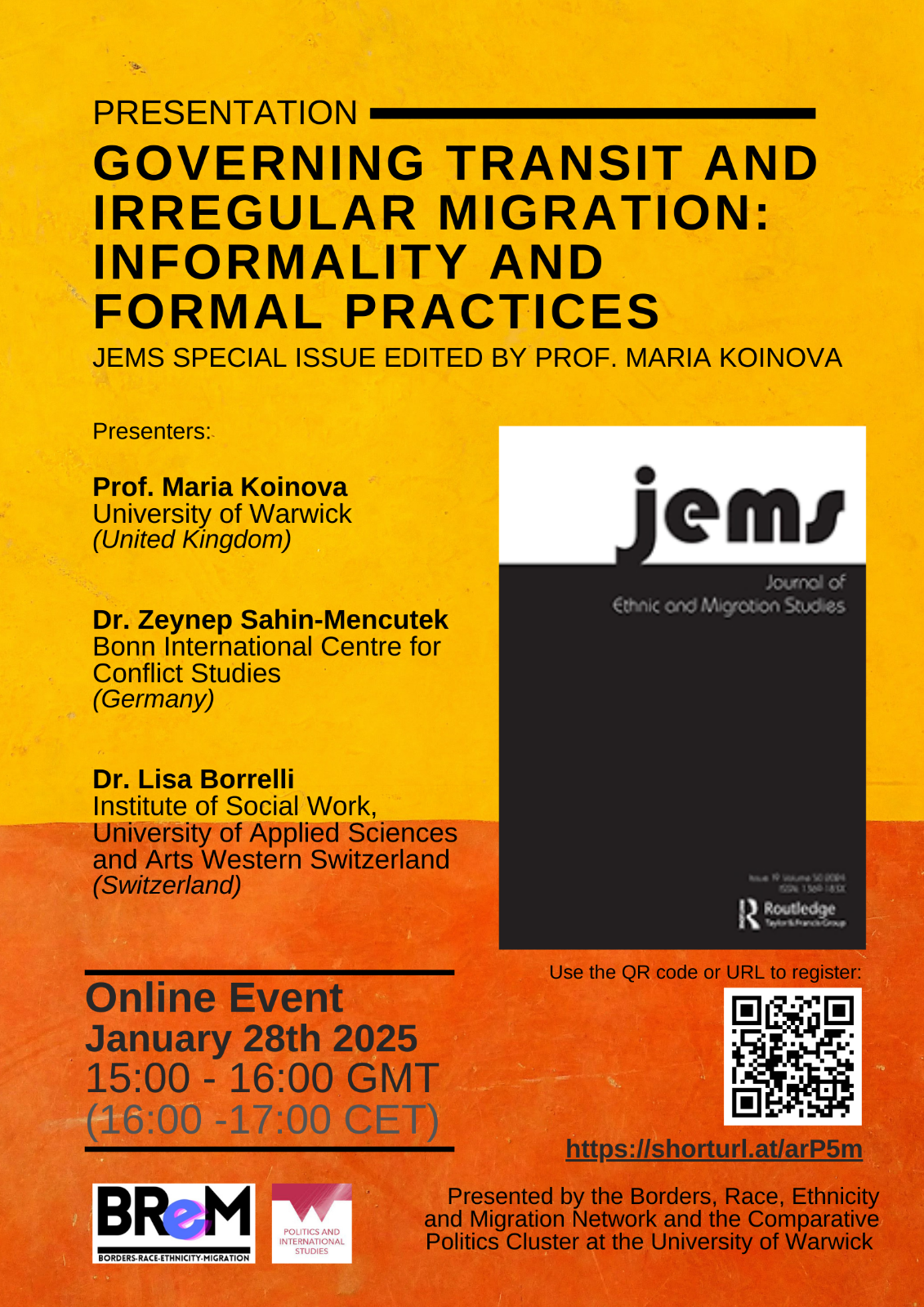
Speakers:
Prof. Maria Koinova, University of Warwick, UK
Dr. Zeynep Sahin-Mencutek, Bonn International Centre for Conflict Studies, Germany
Dr. Lisa Borrelli, Institute of Social Work, University of Applied Sciences and Arts Western Switzerland
About the Special Issue:
Informality has attracted significant attention in migration studies, yet a fresh look is needed given the succession of world crises over the past 15 years and the increasing use of informality to deal with them. Why and how has migration governance experienced informality’s expansion in policies and practices? What are the drivers, sites, temporalities, and implications of such an expansion? How do power relations among different stakeholders affect such governance compared to normative and institutional logics? This collection sheds light on little explored socio-spatial and temporal aspects of informality’s use in such governance, on world politics and political regimes, governing polycentrically and using specific mechanisms of power. Building on extensive fieldwork and data-driven secondary research, this collection covers Germany, Sweden, and Switzerland, post-socialist countries in Eastern Europe, including Belarus and Russia after the 2022 invasion of Ukraine, Turkey and Iraq in the Middle East, and Albania in the Balkans, as well as Thailand and Myanmar in Asia.
Link to the special issue: https://www.tandfonline.com/doi/full/10.1080/1369183X.2024.2371204
BREM Event
BARRIERS TO MENTAL HEALTH HELP-SEEKING AMONG BLACK SUB-SAHARAN AFRICANS IN THE UK: UNVEILING SYSTEMIC CHALLENGES THROUGH CRITICAL RACE THEORY AND THE SILENCES FRAMEWORK
January 21st 2025 in Room FAB 3.32
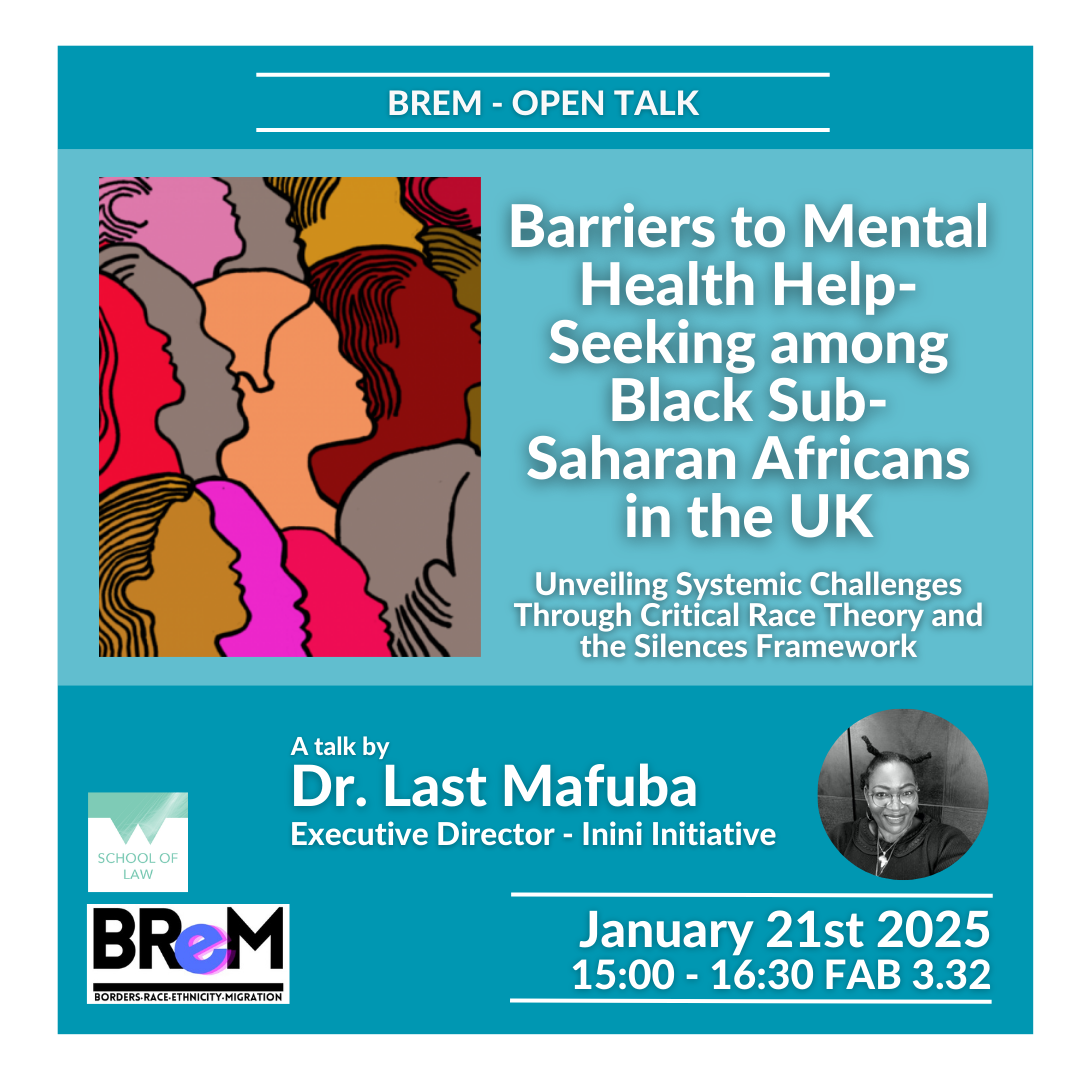
Mental health problems are a leading cause of disease burden worldwide, disproportionately affecting Black communities in high-income countries like the UK. Despite this, Black Sub-Saharan Africans in the UK experience significant barriers to accessing and utilising mental health services, leading to underrepresentation in service uptake and poorer outcomes. This qualitative study investigates the factors influencing mental health help-seeking behaviours among Black Sub-Saharan Africans in the West Midlands of England, with a focus on their socio-cultural and socio-economic environments.
Using Interpretative Phenomenological Analysis (IPA) and guided by Critical Race Theory (CRT) and The Silences Framework (TSF), 21 semi-structured interviews were conducted with participants aged 23–60. Findings reveal a complex interplay of barriers categorised under two superordinate themes: Struggle and Oppression and Medical Colonialism. Participants reported systemic racism, cultural incompetence in mental health services, fear of deportation, and stigma as key obstacles. CRT analysis highlights how historical legacies of colonialism and Eurocentrism shape modern mental health policies and practices, perpetuating inequalities.
This study is the first to combine CRT and TSF in exploring mental health access among this cohort. It underscores the urgent need for culturally sensitive mental health services co-designed with Black Sub-Saharan African communities to rebuild trust and address systemic inequalities. Key recommendations include cultural competence training for practitioners, inclusive policymaking, and the development of alternative assessment tools to better align with diverse cultural narratives.
These findings have critical implications for mental health service delivery, particularly as the UK aims to reduce racial health inequalities. This research provides a foundation for rethinking mental health policies to ensure equitable, accessible, and culturally appropriate care for marginalised populations.
BREM Event
BREM'S BORDER LAB LAUNCH
December 4th 2024 in Room FAB 2.31
Register here to attendLink opens in a new window
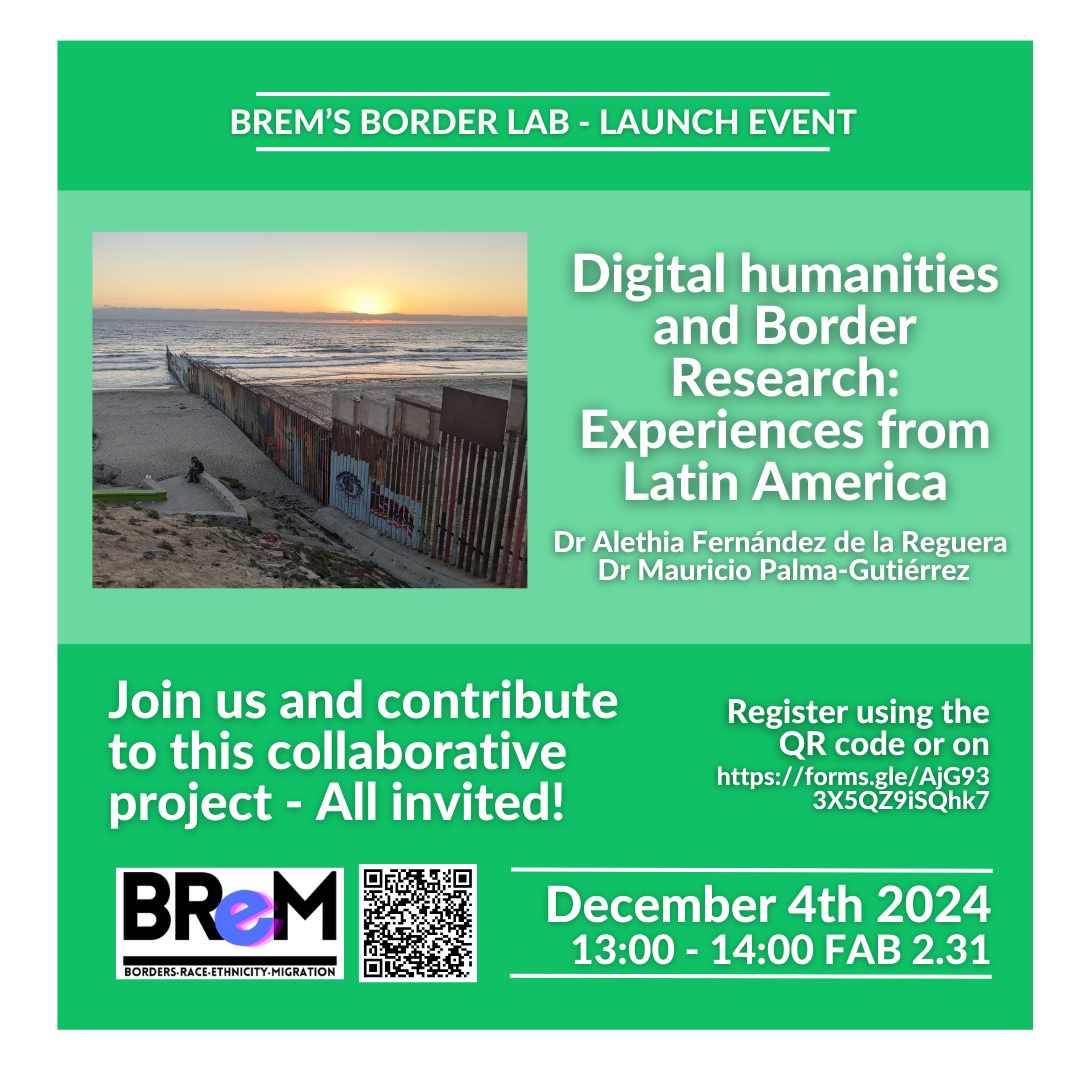
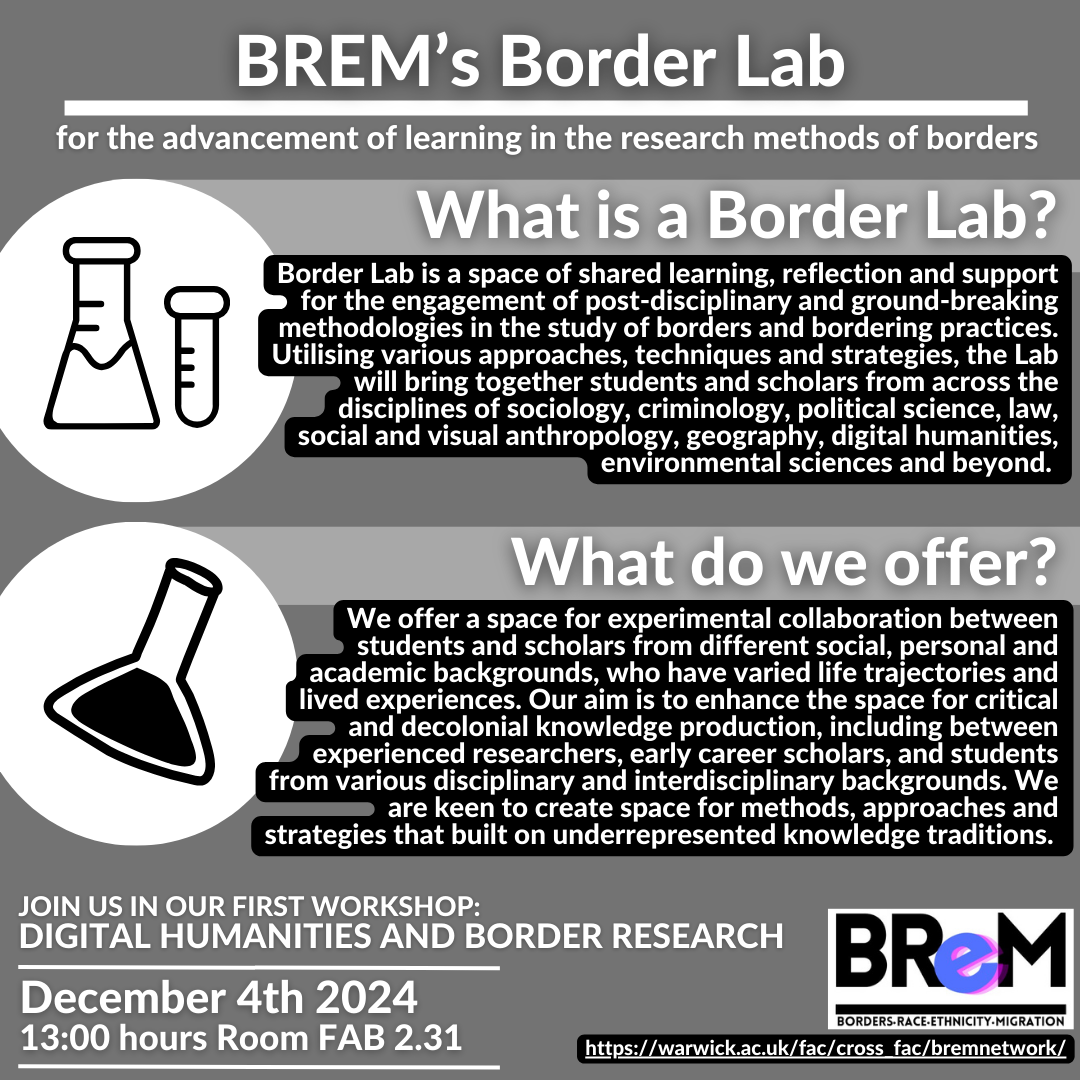
BREM Event
ACCESS TO ASYLUM IN SPAIN : LAW ON THE BOOKS, ADMINISTRATIVE PRACTICE, AND EXPERIENCES OF LAW
November 20th 2024 in Room FAB 2.31
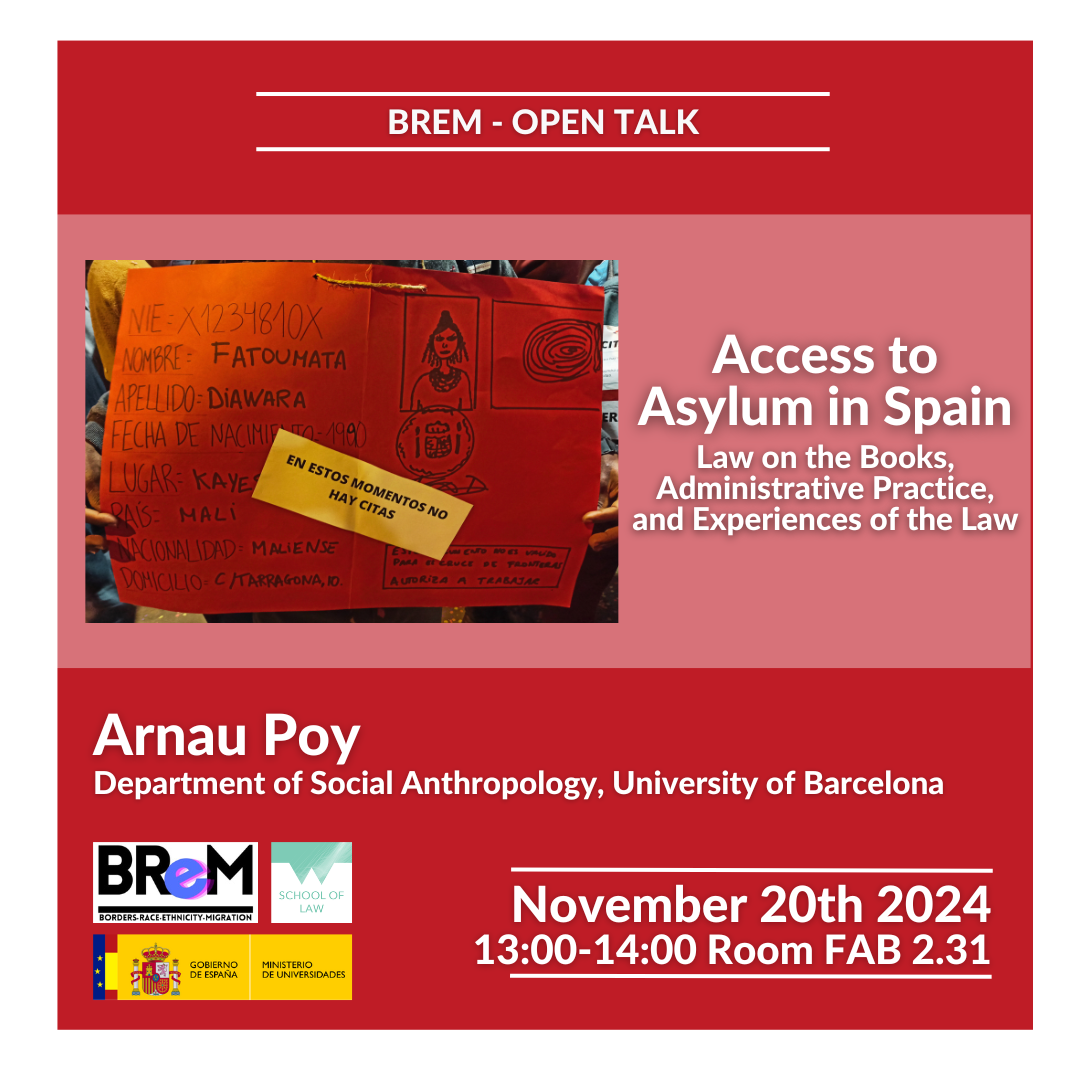
Spain's position within the EU asylum landscape has shifted dramatically, evolving from one of the countries with the fewest asylum applications to ranking among the top three. My PhD research aims to understand the transformations and challenges the Spanish asylum system has faced in response to the significant rise in applications between 2015 and 2023. It closely examines how the current 2009 Spanish asylum law and its key provisions have been implemented in practice, focusing on the difficulties individuals encounter when seeking access to the asylum procedure and the state's reception programme.
Grounded in the tradition of legal anthropology, the research analyses the interplay between the asylum law on the books, its implementation, and the lived experiences of those affected by it. It also highlights the main legal loopholes and extra-legal factors that influence its implementation. Theoretically, it engages with debates around bordering, the deterrence paradigm, and labelling theory.
Employing a multi-sited ethnographic fieldwork approach, the study was primarily conducted in the regions of Catalonia and the Canary Islands. It utilised a diverse range of methodological tools, including participant observation, interviews, digital ethnography, and the analysis of administrative documents, statistical data, and legal frameworks. Based on the experiences of various actors—such as asylum seekers, lawyers, activists, social workers, and members of civil society—the research sheds light on the systemic barriers within Spain’s asylum procedure. It documents the complexities and limitations of the asylum system, offering reflections on how they impact both those seeking protection and other involved actors.
PRESENTER: Arnau Poy
Arnau Poy (Barcelona, 1996) is a predoctoral researcher in the Department of Social Anthropology at the University of Barcelona, where he teaches and participates in various research projects. He is also an active member of the GENI research group and serves on the board of the Catalan Institute of Anthropology. His doctoral research, grounded in the ethnographic tradition of anthropology, examines the implementation of the 2009 asylum law. Beyond academia, Arnau collaborates closely with civil society and third-sector organisations, addressing key issues related to migration and asylum.
BREM Event
PRESENTATION: GOVERNING TRANSIT AND IRREGULAR MIGRATION - BEYOND FORMAL POLICIES AND INFORMAL PRACTICES (JEMS SPECIAL ISSUE)
November 19th 2024 Online
BREM Event
BREM NETWORKING LUNCH 2024-25
October 23rd 2024 in Room FAB 2.31
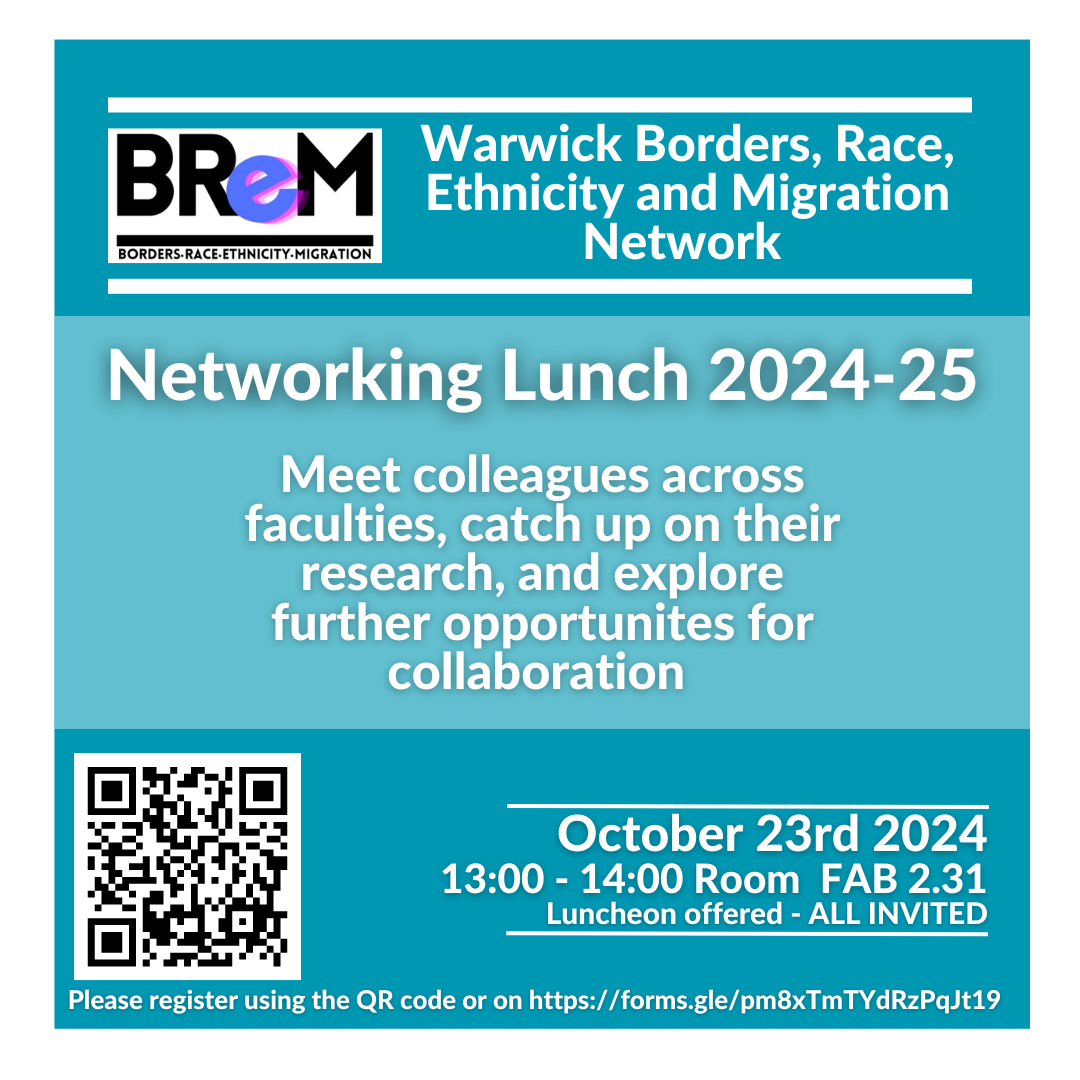
Old and new BREM members are invited to a Networking lunch. This will be an amazing opportunity to get to know other BREM members, chat about collaboration opportunities, and further possibilities of engagement. Lunch offered. ALL INVITED!
To attend please register here: https://forms.gle/pm8xTmTYdRzPqJt19
BREM PGR Workshop
DESIGNING AND CONDUCTING ACADEMIC RESEARCH IN AUTHORITARIAN SETTINGS
June 25th 2024. 15:00 hours in FAB 3.32
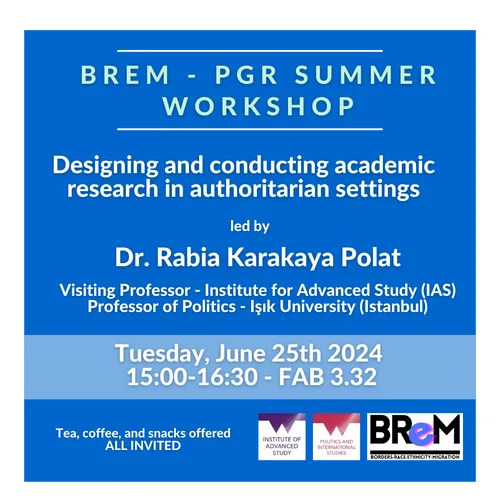
Doing research in authoritarian settings is a particularly challenging endeavour. From a methodological point of view, there are not enough guidelines about how to deal with challenges associated to the complexity of these political contexts. Textbooks on research design usually take democratic environments for granted and do not provide much information relevant for non-democratic contexts. How can researchers contribute to close this gap?
In this workshop, Dr. Rabia Polat (IAS Visiting Professor and Professor of Politics Işık University Istanbul) will build on her experience working in these types of contexts. She will comment on how she has dealt with some of the practical challenges related to the research design and implementation in authoritarian contexts. Some of these include arranging interviews with key actors, building trust with officials and communities, considering the implications of external funding, and reflecting on positionality.
Students will be invited to comment on their own experiences and views, in order to engage in a productive conversation about the possibilities of action, limitations, and considerations when undertaking research in authoritarian contexts.
Proposed structure:
15:00 – 15:30 Presentation by Dr. Rabia Polat
15:30 – 15:50 Open discussion / Q+A with members
15:50 – 16:30 Scenario building: Designing research strategies (small groups)
All invited!
BREM Discussion Panel in collaboration with SQRN
QUEER MIGRATIONS: PERSPECTIVES, PRACTICES AND POSSIBILITIES
April 24th 2024. 13:00 hours in FAB 2.32
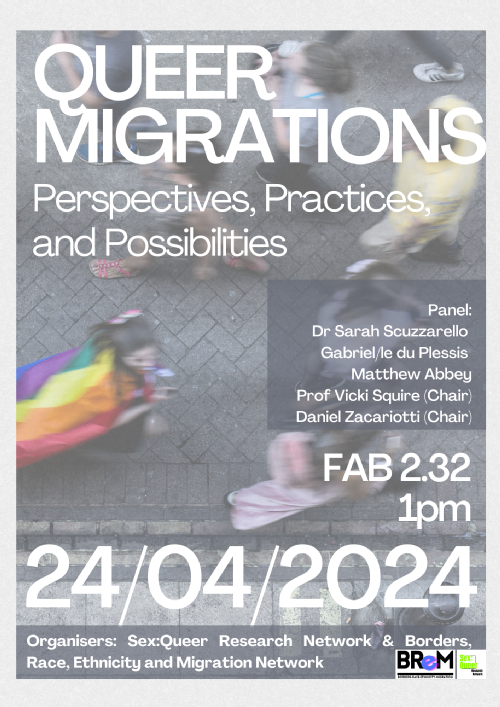
SQRN and BREM cordially invite you to the round table “Queer Migrations: Perspectives, Practices, and Possibilities” on the 24th of April at the Faculty of Arts, University of Warwick. The event, featuring Dr Sarah Scuzzarello, Gabriel/le du Plessis and Matthew Abbey, will provide a platform for the presentation of the speaker’s cutting-edge research and a debate intellectual exchange on the complexities surrounding queer migrations globally.
Sarah Scuzzarello (PhD Lund University) is an Associate Professor of Migration at the University of Sussex and an affiliated researcher at the Sussex Centre for Migration Research. She is the co-founding co-coordinator of the IMISCOE’s Standing Committee on Gender and Sexuality in Migration Research (GenSeM) and an elected member of the IMISCOE Executive Board. Over the last decade, she has established a research program focused on how transnational migration and intergroup relations are affected and shaped by gender relations and sexuality and how institutional discourses and policies shape migrants’ collective identification and life chances. Sarah has conducted research in the UK, Sweden, Italy and Thailand, often from a comparative perspective.
Matthew Abbey is a scholar interested in political and social theory, focusing on aesthetics, violence, migration, sexuality, technology, climate change, and speculative thought. His current research explores climate change, migration, and planetary devastation using a queer, decolonial lens. The project will begin by analysing the racialised risk calculations in forecasting migration. The following part will explore how various aesthetic and cultural texts engage with the ephemerality of human-nonhuman relationships forged during migration experiences.
Gabriel/le du Plessis is a doctoral candidate at the University of Warwick. Their doctoral research focuses on queer and trans-forced migration in East Africa. It considers the ways queer and trans refugees develop protection strategies, establish support networks, and advocate for international assistance. Their research interests include SOGIESC asylum, queer theory, and sexuality in mediated and transnational contexts.
AFRICAN VOICES IN THE UK ASYLUM SYSTEM - DOCUMENTARY SCREENING
April 18th 2024. 19:00 hours, FarGo Village (Far Gosford Street, Coventry CV1 5ED)
Join us in documentary short film screening and panel discussion about experiences of the UK asylum system, featuring interviews produced by Inini service users in collaboration with Duncan Whitley (Filmmaker in Residence at University of Warwick Film and Television Studies 2022/23). The screening will be followed by a panel discussion chaired by Ana Aliverti (BREM), with a panel whose diverse expertise and experience covers lived experience of the asylum system, law, activism, mental health and community organisation. The conversation will explore some of the issues faced by people seeking Leave to Remain, and the dehumanisation of the asylum bureaucracy.
Panel speakers:
Ana Aliverti is Professor of Law at the University of Warwick and BREM member. She researches border regimes and the intersections of these with criminal justice logics, actors and practices. Her monograph ‘Policing the Borders from Within’ was published in 2021 by Oxford University Press. Ana is currently conducting work on the asylum bureaucracy in the UK. She is a member of Borders, Race, Ethnicity and Migration (BREM) Network at University of Warwick.
Andrew Nyamayaro is a legal professional serving as Principal Solicitor at Tann Law Solicitors Ltd. He is a contributor on immigration content for the global publisher By Lawyers. Andrew has a legal background covering immigration, family, employment and human rights law. He has extensive experience assisting people seeking asylum and humanitarian protection in the UK, and has worked with victims of domestic violence and human trafficking.
Loraine Masiya Mponela is a mother, poet, activist and community organiser. Loraine is the author of “I was not born a sad poet” and “Now I Sing: 50 poems to celebrate 50 years”. She was chair of CARAG (Coventry Asylum and Refugee Action Group) 2018-2022, and is a founder member of Sisters Not Strangers Coalition and Status Now 4 All Network. Loraine received Leave to Remain in the UK in 2022 after seven years in the asylum system. She currently works for Migrant Voice charity in Birmingham.
Last Mafuba is the founder and CEO of Inini Initiative, a social enterprise providing psychosocial interventions to refugee and migrant communities. She is a dedicated advocate for social justice with a profound commitment to promoting equity and empowering marginalised communities. With a diverse background in psychology, law, and human rights, she has been instrumental in advancing the well-being and rights of this cohort.
Migrating Dreams and Nightmares Exhibition:
The event takes place in association the ‘Migrating Dreams and Nightmares’ photographic exhibition curated by Kate Rossin at Commonground, featuring text and images from John Berger and Jean Moir from their seminal book ‘A Seventh man’ first published in 1973. The curation by Kate at Commonground builds on a collaboration between Berger and Mohr with Goldsmiths Sociology Department in 2015, in which the exhibition was designed and curated as a passageway of learning encounters by Nirmal Puwar and Mariam Motamedi Fraser, as Co-Directors of the Methods Lab. At Commonground they have also joined up with Hannah Jones (University of Warwick).
For more information on the exhibition: https://www.facebook.com/Commongroundcoventry/
BREM Annual Lecture
RESISTING RACIAL CAPITALISM - A LECTURE BY DR. IDA DANEWID
February 21st 2024. 15:00-16:30 hours in Lecture Theatre 4 (L4)
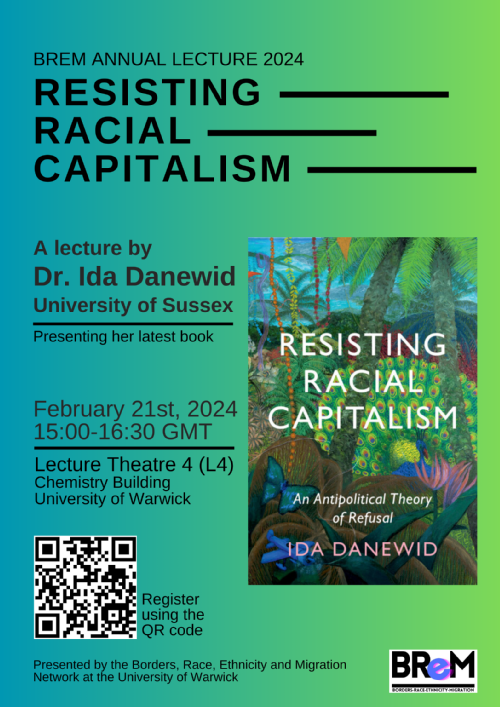
Register here: https://forms.gle/fBNYykSgkBHdEu5K6
More about Dr. Danewid:
She is a social and political theorist based in the Department of International Relations at the University of Sussex. Her research interests are in anti-colonial political thought, the black radical tradition, gender studies, and histories of internationalism “from below.” At Sussex, she convenes the modules "Policing Racial Capitalism", "Race, Gender, and Global Capitalism", and "Introduction to International Political Economy." Her work examines the historical and evolving relation between capitalism, state violence, and the production of raced, sexed, and geographical differences. She is co-editor of "The Black Mediterranean" (Palgrave Macmillan, 2021) and the special issue "Racialized Realities in World Politics" (Millennium: Journal of International Studies, vol. 45, no.3).
Her first book, "Resisting Racial Capitalism: An Antipolitical Theory of Refusal" (Cambridge University Press, 2023), explores the role of state power in the making of racial capitalism. By tracing the global histories of four technologies of state violence—policing, bordering, wastelanding, and reproductive control—it excavates an antipolitical archive of anarchism that stretches from the favelas of Rio de Janeiro to the borderlands of Europe, the poisoned landscape of Ogoniland, and the queer lifeworlds of Delhi. Thinking with a rich set of scholars, organisers, and otherworldy dreamers, the book theorises these modes of refusal as a utopian worldmaking project which seeks, not just better ways of being governed, but an end to governance in its entirety. In a time where the state remains hegemonic across the Left-Right political spectrum, "Resisting Racial Capitalism" calls on us to dream bolder and better in order to (un)build the world anew.
BREM - PAIS Department series
FROM DE-EUROPAISATION TO EURASIANISM? TURKEY BETWEEN HE WEST AND RUSSIA
January 24th 2024, 15:00-16:00 hours in S0.13
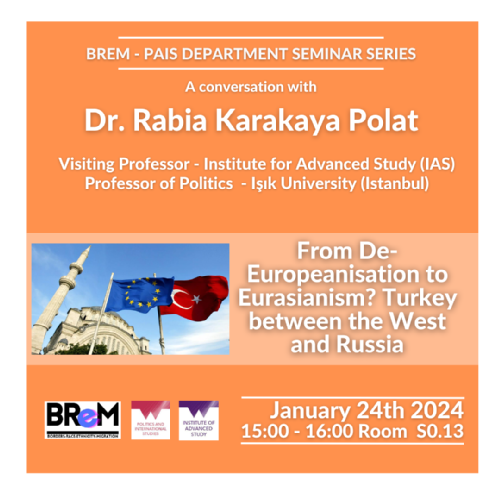
BREM Panel Discussion
MIGRATION & DETENTION
November 22nd 2023, 13:00-14:30 hours in S0.17
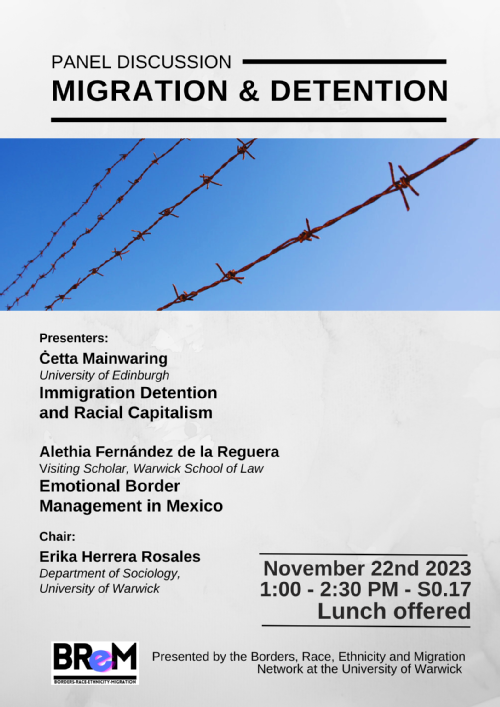
More about the presentations in the panel:
Immigration Detention & Racial Capitalism
By Ċetta Mainwaring
Immigration detention systems are expanding around the world, despite clear evidence that they cause harm and do not deliver stated policy objectives. Immigration detention fails to deter migrants. It is disproportionate to the objectives of immigration control, discriminates on the basis of race, gender and class, and is often tantamount to inhuman and degrading treatment. This article investigates why detention persists despite these failures by examining three factors that help us to understand why immigration detention policies continue to be pursued: (1) the ways in which detention acts as a spectacle; (2) the role of different non-state actors that encourage the expansion of detention; and (3) histories of colonialism that connect to current detention policies through their similarly racialized use of violence and incarceration. In doing so, I argue that understanding immigration detention within a framework of racial capitalism allows us to connect the contemporary political economy of immigration detention with longer carceral histories of empire. The article draws on empirical data from the UK, the US and Australia.
Dr. Mainwaring is an author and activist. She is currently a Senior Lecturer in Politics at the University of Edinburgh. Her research interests include migration, borders, and the Mediterranean. Her first award-winning book, At Europe’s Edge: Migration and Crisis in the Mediterranean was published by Oxford University Press in 2019
Emotional border management in Mexico: on how emotions trigger legal violence
By Alethia Fernández de la Reguera
Bureaucrats working in immigration detention centers usually establish social and emotional barriers with incarcerated migrants, thus avoiding emotional and ethical conflicts. However, emotional management turns out to be an intrinsic part of their work. Furthermore, without having elements for containment and self-care, it has severe consequences for safeguarding the human rights of people in mobility. Therefore, it is necessary to reflect on emotional management in the symbolic and real work by State agents safeguarding borders and national security. In this article I analyze emotions as central factors of bureaucrats' decision-making in immigration policy. I study the emotions that emerge from the social interaction between immigrants and both, INM and National Guard agents, and frame the research in an institutional ethnography to analyze these emotions regarding the norms, discourse, and institutional practices of securitization and criminalization of immigrants. I focus on immigrant detention centers or migrant prisons, as they are spaces where affective eruptions emerge (Mountz, 2017) or, as explained below, the trauma transmitted and expressed in different ways and by all the people who fulfill their role in these places. The objective is to demonstrate that emotions allow us to understand the complexity of power relations in the immigration bureaucracy and reflect on what emotions tell us to understand the discourses and institutional practices of immigration policy.
Dr. Alethia Fernández de la Reguera Ahedo is a full time researcher at the Institute of Legal Research of UNAM and Coordinator of the National Diversities Laboratory of UNAM and of the institutional research track: "Rights, Migrations and Mobilities". She is currently a visiting scholar at the Criminal Justice Centre – School of Law at the University of Warwick. In 2021 she received the National University Distinction Award for Young Scholars 2021 in the area of social science research. She coordinates the Diploma “Gender and Equality Policies” and is academic coordinator of the Diploma “International Law for Refugees and International Protection in Mexico” at UNAM. She is a researcher at CAMINAR (Comparative Analysis on International Migration and Displacement in the Americas) and a member of the National System of Researchers. Specialist in gender and migration, immigration detention, bureaucracies, gender violence and women's autonomy. She recently published the article Immigration Detention, the Patriarchal State and Politics of Disgust (2022) the book Detención migratoria. Prácticas de humillación, asco y desprecio (2020) and her book Caravanas in co-authorship with Luciana Gandini and Juan Carlos Narváez was awarded the 2019 - 2020 "Willian M. LeoGrande Award” as the best book on Latin American Studies by the Center for Latin American Studies at the American University.
More about the event's chair:
Dr. Erika Herrera Rosales is a Teaching Fellow in the Department of Sociology at the University of Warwick. She received her PhD in Sociology from the same university. Her doctoral research explored power relationships between NGOs and Central American migrants trying to cross the US-Mexico border. She was awarded with an Early Career Fellowship from the Institute of Advanced Studies. Her forthcoming book “Ambivalent humanitarianism: Colonial legacies, migration control and the experiences of migrants in Mexico” focuses on global migration, bordering practices and deterrence practices of humanitarian workers from a postcolonial and decolonial perspectives. Her research aims to bridge the voices of previously excluded individuals to improve their social conditions.
BREM Conversations / in collaboration with IAS
LED BY DR. RABIA POLAT
November 15th 2023, 16:00-17:30 hours in S2.12
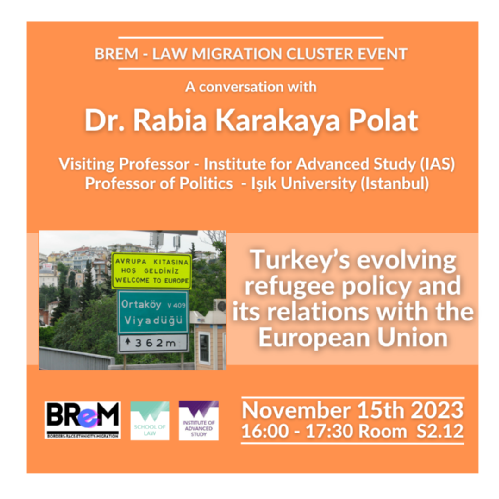
Turkey is home to the world’s largest refugee population, with almost 3.6 million Syrians under temporary protection. Since the beginning of the conflict in Syria, the ruling Justice and Development Party (JDP/AKP) followed an open-door policy accompanied by a discourse emphasizing religious solidarity and humanitarian values. Turkey’s refugee policy has become a source of pride and enabled the AKP to claim moral superiority both vis-à-vis the West and its political opponents at home.
The refugee response in Turkey has an important international dimension characterised by both cooperation and conflict. In March 2016, the European Union and Turkey agreed on the EU-Turkey Statement which aimed to address the influx of refugees into the European Union. Under the terms of the deal, Turkey agreed to take back refugees who had crossed into Greece illegally. In return, the EU promised financial aid to support Syrian refugees in Turkey, as well as other forms of assistance to the Turkish government. This deal also included a commitment to accelerate visa liberalisation for Turkish citizens and to revitalize Turkey's EU accession process.
Seven years after the signing of the deal, there have been concerns about the human rights implications of returning asylum seekers to Turkey, as well as the broader ethical and legal implications of externalizing the responsibility for managing migration. The Turkish side has also become disappointed about insufficient financial assistance and the lack of progress in visa liberalisation. In domestic politics, the government’s discourse has been shifting towards ‘voluntary return’ amid a deep economic crisis and the rising discontent towards refugees.
We invite you to this conversation. No previous registration needed
BREM Research Workshop
LED BY DR. ANGHARAD CLOSS STEPHENS (Swansea University)
July 18th 2023, 11:00 - 13:00 hours in A0.05
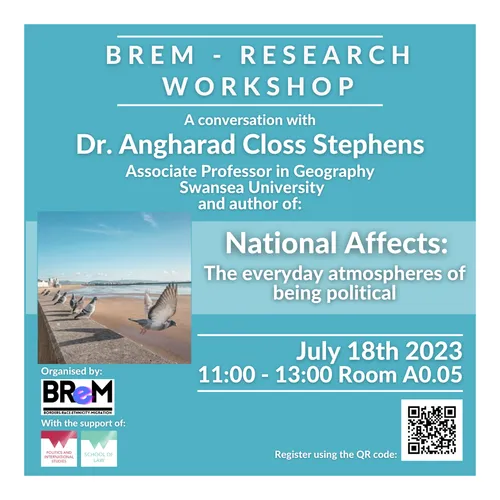
We will be hosting a conversation with Dr Angharad Closs Stephens (Associate Professor of Geography, Swansea University) about her book, National Affects: the everyday atmospheres of being political (Bloomsbury, 2022). All welcome!
Drawing on a combination of artistic and academic interventions, National Affects offers a refreshing approach to conceptualising the politics of nationalism, identity, and citizenship. Whilst identity is widely acknowledged to be a felt experience, questions of atmosphere, mood and public sentiments are rarely made central to understanding the global politics of nationalism. The book traces how ideas about 'us and them' take form in ordinary spaces, in ways that are both deeply felt and hardly noticeable, in studies of global events that range from the London 2012 Olympic Games to responses to acts of terror, the European refugee crisis and Brexit. It draws on academic theories in the study of Politics, International Relations and Human Geography, as well as stories, performance works and novels, to establish a new tone of critical enquiry.
Following a presentation of the book, the discussion will focus on the affective dimensions of being together and on how these open new angles in the study of nationalism and global politics. We will reflect on how the nation is felt in everyday life and how nationalism is differently experienced, focusing on alternative ways of imagining and practising being political together, beyond the exclusionary politics of nationalism.
The event will take place on Tuesday 18th July, 11:00 – 13:00 in room A0.05. This is an open event. Refreshments will be offered.
We kindly ask you to register beforehand using the form available here.
BREM PGR Summer Workshop
LED BY DR. AMAL ABU-BAKARE (Liverpool)
June 6th 2023, 15:00-16:30 hours in OC1.08
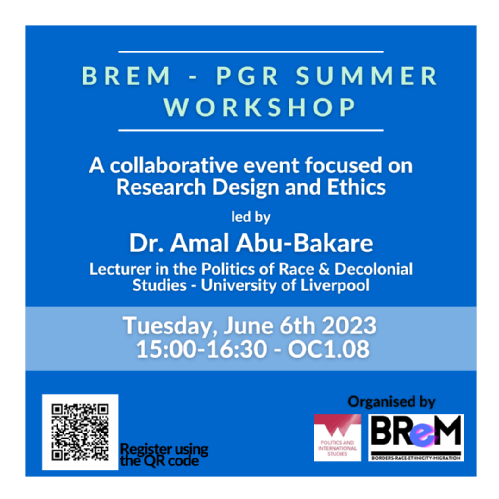
Our annual PGR Workshop this year will focus on Research Design and Research Ethics. It will be led by Dr. Amal Abu-Bakare (University of Liverpool).
PGRs working on Borders, Race, Ethnicity, Migration and Postcoloniality are strongly encouranged to attend. This is a wonderful opportunity to discuss your own research and to comment on some of the related issues that are transversal to our investigations.
If you are interested, please register here: https://forms.gle/ATAPgyP6GZ48TU9P9
BREM Book Launch (Online)
EVERYDAY BORDER STRUGGLES. SEGREGATION AND SOLIDARITY IN THE UK AND CALAIS
February 8th 2023
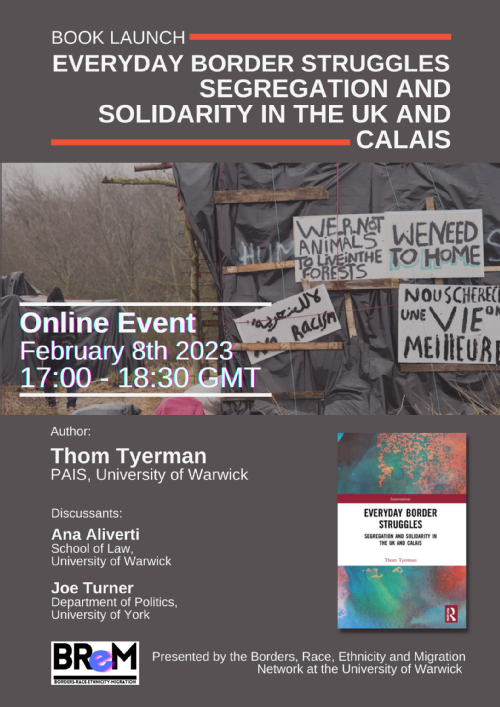
Please feel free to share this invite with your networks
BREM Book Launch (Online)
POSTCOLONIALITY AND FORCED MIGRATION. MOBILITY, CONTROL, AGENCY
November 23 2022
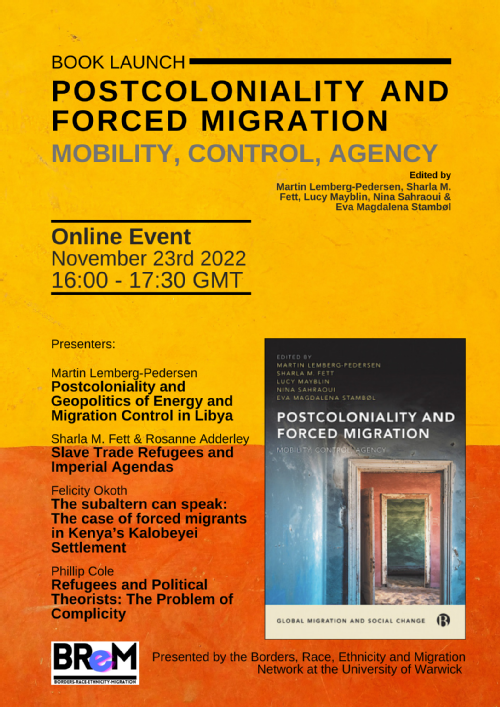
Please feel free to share this invite with your networks
BREM PGR Seminar (Online)
November 16 2022
Join us to know more about the research of our PGR members. All welcome!
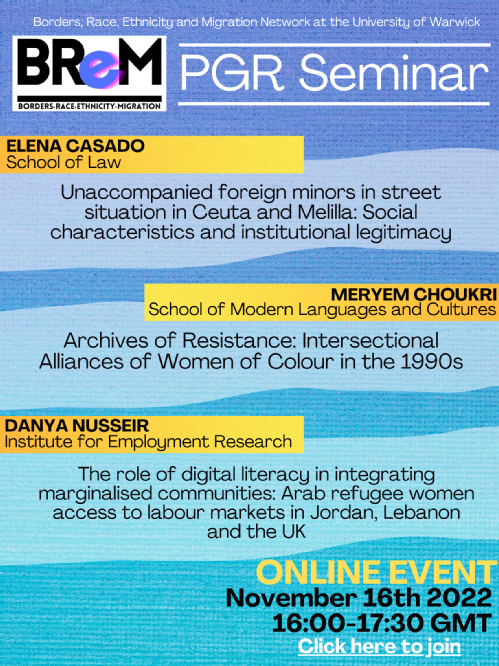
Please feel free to share this invite with your networks
BREM-WICID Event: Participatory research with Duncan Whitley
October 12 2022
BREM and WICID are inviting you to a face-to-face event with Duncan Whitley, Filmmaker in Residence in Film and Television Studies, 2022-23. During this time, he will engage in research and development of his new project ‘Vanishing Point’. It will look at the iconography of the road movie as a vehicle to explore key themes of memory, loss, movement and migrations. Trained as a visual artist, Whitley’s filmmaking practice often combines elements of participatory practice, with collaborative research and co-creation central to his creative process.
During his time at University of Warwick, Whitley is looking to work with researchers around themes of landscapes, migrations and identity. The event is an extraordinary opportunity for BREM and WICID members, as well as for other researchers, to share, connect, and engage in this joint research venture.
The event will take place on October 12th, 2:00-4:00 pm in OC1.01.
Please feel free to share this invite with your networks.
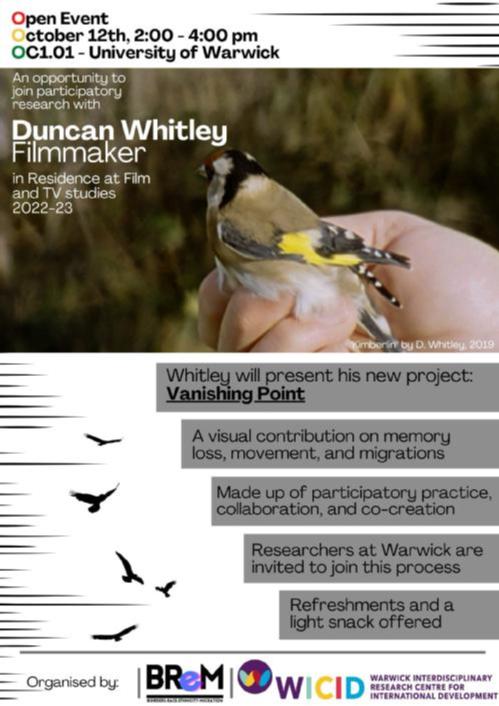
More About Duncan Whitley:
Duncan Whitley (born UK, 1974) is an artist and filmmaker whose practice synthesises the languages of cinema, documentary and spatial sound art. He is interested in themes of personal and cultural memory and loss. His work has been shown at Aesthetic Film Festival (York), Flatpack Film Festival (Birmingham), Whitechapel Gallery (London), Whitworth Museum (Manchester), b-side Festival (Portland, Dorset), ‘UNSAM’ Centre for Experimental Art (Buenos Aires), Museo de Bellas Artes (Salta, Argentina), Serralves Museum (Porto), Coventry Biennial, and Herbert Art gallery & Museum.
BREM / STAR (Students Action for Refugees) Seminar
May 2022
Avindri Chandraharan and Vicki Squire organised a seminar for members of STAR, with presentations from Ahmad Akkad, Ana Aliverti, Dallal Stevens.
PhD Workshop
10:30 - 12:00, 26 April 2022, Online
BREM introductory PhD meeting
Postgraduate research students who joined Warwick in the last years and are working across the areas of borders, race, ethnicity and/or migration joined to get know more from fellow PhD students working on these themes across multiple departments, and to discuss ways that BREM can support the PhD community at Warwick.
Research Seminar with Dr Cecilia Vergnano
13:00-14:00, 30 October 2019, Humanities Building, Room H0.03
Refugee crisis or EU crisis? Security and market forces at internal EU borders
Dr Cecilia Vergano, University of Amsterdam, Visiting Scholar PAIS Warwick
Critical scholars highlighted that the so-called European refugee crisis can be better defined as an internal European governance crisis. The ‘pushback-based’ governance of asylum seekers’ internal movements, strongly connected with increasing surveillance and militarization of Schengen internal border, makes the endogenous, rather than the exogenous, character of this crisis especially visible. However, borderization processes at the internal EU level take place in different ways according to several factors and local specificities. Is the "border spectacle" (De Genova 2013) always a necessary condition to justify the selective border closure and the exclusion of undocumented, racialized migrants from the free-mobility privilege? The comparative, ethnographic analysis of governance strategies and everyday border practices at the French/Italian and the Austrian/Italian borders clearly discloses the interplay between the two imperatives of security and free market needs. The comparison between the two cases, based on quantitative and qualitative data, suggests the hypothesis that market needs of borders’ openness and invisibility may influence the dynamics of border management, in terms of visibility of border controls (border spectacle). Where the interest in fast circulation of freight prevail, such as at the Austrian/Italian border of the Brenner Pass, the filtering of irregular migrants tends to be less visible (and more effective in securitarian terms) than border controls aimed at feeding an increasing border security industry, such as at the French/Italian border.
Cecilia Vergnano is a Social Anthropologist from the University of Barcelona, with a PhD dissertation on forced (im)mobilities of Roma migrants in Europe. She is currently a Marie Slodowska-Curie Research Fellow at the Amsterdam Institute for Social Sciences Research (AISSR) of the University of Amsterdam, with a research project about the social and political impacts of the reintroduction of border controls within the Schengen area and the policing of asylum seekers autonomous mobility through pushbacks at internal EU borders. Her research interests are borderization processes, forced (im)mobilities, racialization processes, border-crossing facilitation practices, territorial stigmatization, forced evictions.
**CO-ORGANISED WITH THE DEPARTMENT OF POLITICS AND INTERNATIONAL STUDIES, WHERE DR VERGNANO IS A VISITING SCHOLAR DURING OCTOBER-NOVEMBER 2019.
BREM Network Business meeting
12:00-13:00, 30 October 2019, Humanities Building, Room H0.03
This will be an opportunity to meet colleagues working in related areas, share research interests and explore possible collaborations, and put forward ideas for BREM group activities over the coming year.
Migrating Dreams and Nightmares - BREM Exhibition
Located in the atrium of the Social Sciences building and next to the Warwick Art Centre, “Migrating Dreams and Nightmares” is an exhibition that raises questions about migration in Europe, transforming the atrium space into a dream/nightmare-scape of fluctuating migrant experiences, and asking us to consider resonances and dissonances between meanings of migration in Europe over time.
The exhibition is based on words and photographs from John Berger and Jean Mohr’s book "A Seventh Man" together with notes from current research on migration in the twenty-first century by the Warwick Borders, Race, Ethnicity and Migration Network, and the featuring artwork by Antoinette Brown."
Warwick Borders, Race, Ethnicity and Migration Network Public Lecture 2017
Lemn Sissay
Tuesday 16th May 6.30pm-7.30pm
Room OC0.03, Oculus Building, University of Warwick
We are extremely pleased to announce that the 2017 BREM Annual Lecture will be given by poet, performer, thinker, campaigner and Chancellor of the University of Manchester, Lemn Sissay. Lemn’s writing engages with themes of borders, race, ethnicity and migration (among other things) and this will be a chance for researchers across all disciplines in the university to reflect on these themes in new ways, in the company of a public audience who are invited to this free event to enjoy Lemn’s talk and find out more about the research on these themes going on at the University of Warwick. Find out more about Lemn Sissay and book your place at the BREM Annual Lecture by going to http://brem2017.eventbrite.com
Precarious Trajectories: Voices from the Mediterranean Migration Crisis
Film by Dr Simon Parker (University of York), followed by Q&A discussion with Dr Simon Parker, Dr Myria Georgiou (LSE), and Dr Vicki Squire (University of Warwick)
Monday 30th January 2017, 6-7:30pm
Chapter House, Coventry Cathedral, Coventry
Set on location in Libya, Italy and Greece during 2015-2016, at the height of the Mediterranean migration crisis, Precarious Trajectories focuses on the perilous sea crossings that hundreds of thousands of refugees have undertaken in recent years in order to arrive at what they hope will be the safer shores of Europe through the eyes of Ruha from Syria and Ahmed from Somalia.
Communication Architecture of the Border: A Humanitarianism/Securitization Nexus
Talk by Dr Myria Georgiou (LSE)
Monday 30th January 2017, 3-4pm
Wolfson 1
This presentation examines the communication architecture of the border and the ways in which narratives and moralities of securitization and humanitarianism become intrinsically intertwined in the acts of reception of refugees and migrants in Europe's borderland. The communication architecture of the border involves all different actors of reception, who sometimes converge and sometimes compete with each other: border military forces and police; INGOs; networks of solidarity. What will be argued it that this architecture shapes a politics of the border, while at the same time playing a critical role in establishing the conditions of (im-)possibility for migrants and refugees to be accepted in Europe. The presentation draws from research conducted with L.Chouliaraki at the Greek island of Chios and at the peak of the so-called “migration crisis” of 2015-16.
Myria Georgiou is Associate Professor and Deputy Head of Department at the Department of Media and Communications, LSE. She has a PhD in Sociology (LSE), an MSc in Journalism (Boston University) and a BA in Sociology (Panteion University, Athens). Her research focuses on identity, migration and diaspora; media and the city; and the ways in which media contribute to constructions of identity across space. For more than 20 years she has been conducting and leading cross-national and transurban research across Europe and between British and American cities. Her latest book Media and the City was published in 2013 (Polity Press).
BREM Network Meeting: Warwick, a University of Sanctuary?
Discussion led by Dr Vicki Squire (PaIS) and Dr Lucy Mayblin (Sociology)
Monday 30th January 2017, 2-2.45pm
Wolfson 1
This meeting will provide updates and provide opportunity for feedback and discussion on initiating a programme of events at Warwick toward becoming a University of Sanctuary.
BREM Network Public Lecture 2016
Post Racial Fantasies in an Age of Diversity and Migration
Yasmin Alibhai-Brown
Wednesday, 8th June 5pm-6.30pm
Room MS.05, Maths Building, University of Warwick
Yasmin Alibhai-Brown came to this country in 1972 from Uganda. She completed her M.Phil. in literature at Oxford in 1975. She is a journalist who has written for The Guardian, Observer, The New York Times, Time Magazine, Newsweek, The Evening Standard, The Mail and other newspapers and is now a regular columnist on The Independent and London’s Evening Standard. She is also a radio and television broadcaster and author of several books. Her book, No Place Like Home, well received by critics, was an autobiographical account of a twice removed immigrant. From 1996 to 2001 she was a Research Fellow at the Institute for Public Policy Research which published True Colours on the role of government on racial attitudes. Tony Blair launched the book in March 1999. She is a senior fellow at the Foreign Policy Centre. In 2000 she published, Who Do We Think We Are? which went on to be published in the US too, an acclaimed book on the state of the nation. Andrew Marr and Sir Bernard Crick among other reviewers found the book exceptionally wise and challenging. After Multiculturalism, a pamphlet re-assessing the multicultural ideology in Britain was the first critical examination by a social democrat of a settled and now damaging orthodoxy. She is also a regular international public speaker in Britain, other European countries, North America and Asian nations. In 2001 came the publication of Mixed Feelings, a book on mixed race Britons which has been praised by all those who have reviewed it to date. In June 1999, she received an honorary degree from the Open University for her contributions to social justice. She is a Vice President of the United Nations Association, UK and has also agreed to be a special ambassador for the Samaritans. She is the President of the Institute of Family Therapy. She is married with a twenty eight year old son and thirteen year old daughter.
In 2001 she was appointed an MBE for services to journalism in the new year’s honours list. In July 2003 Liverpool John Moore’s University made her an Honorary Fellow. In 2003 she returned her MBE as a protest against the new empire in Iraq and a growing republicanism. In September 2004, she was awarded an honorary degree by the Oxford Brookes University. In April 2004, her film on Islam for Channel 4 won an award and in May 2004, she received the EMMA award for best print journalist for her columns in the Independent. In September 2004, a collection of her journalistic writings, Some of My Best Friends Are… was published in 2005. Since that year, she has been seen on stage in her one woman show, commissioned and directed by the Royal Shakespeare Company as part of their new work festival. In 2005, she was voted the 10th most influential black/Asian woman in the country in a poll and in another she was among the most powerful Asian media professionals in the UK. In 2008 she was appointed Visiting Professor of Journalism at Cardiff University School of Journalism, Media and Cultural Studies and Visiting Professor of Journalism at the University of Lincoln.
The Refugee Rights Data Project
Talk by Hannah-Sophie Wahle
Wednesday, 22nd of June 2016, 1 to 2 pm
Social Sciences Building, Room S0.50.
Lunch will be served beforehand from 12.30 to 1 pm.
Hannah-Sophie Wahle is currently working with the Refugee Rights Data Project (RRDP) as a researcher and is completing her postgraduate studies in Comparative Politics at the London School of Economics and Political Science (LSE). Having participated in a training course on the refugee crisis response with RedR UK, she has subsequently been volunteering in the Calais camp frequently and in diverse capacities. Prior to this, she supported asylum-seekers and refugees in the asylum process in Germany.
The aim of the presentation is to provide a brief overview of the Refugee Rights Data Project (RRDP) and to present some of the key findings from the pilot study in Calais. This study was conducted in February 2016 and surveyed 870 respondents in the Calais camp, where thousands of refugees and displaced people are living in dire conditions. The findings were published in April 2016 in the report entitled “The Long wait: Filling the data gaps relating to refugees and displaced people in the Calais camp”. This report measures the fulfilment of different aspects of the Universal Declaration of Human Rights and includes data relating to the camp’s demographic composition, living conditions, human rights violations and future aspirations. The report has been quoted by various media outlets, including the Guardian and the Independent, and has been used as evidence by the EU Home Affairs Sub-Committee for its inquiry on unaccompanied minors in the EU.
The talk will also be part of Refugee Week.
Also, it is part of the Positive Images Festival in Coventry.
BREM Methodology Workshop: Migration, Mobility and Transgenerational Identity
16th March 2016, 1:00 - 5:00 p.m.
Room: S2.73 (Social Sciences)
Margaret Hills de Zárate, Senior Lecturer at Queen Margaret University, Edinburgh, will lead this interdisciplinary workshop exploring participatory and ethnographic research methods in relation to migration, mobility and cultural identity. The workshop will introduce her own methodology, used in both current research on 'Transnationalizing Modern Languages' and previous psychosocial work undertaken with refugees and child ex-combatants. This will be followed by an experiential workshop, exploring the role of objects in the expression of transgenerational cultural identity.
The workshop is open to all researchers working across the University and will be of particular interest to Early Career Researchers interested in exploring new methodological approaches.
Methodology Workshop with Anna Lundberg (Malmö University)
Researching enactment of rights from below:
Ethical and political concerns, and human rights as a radical element in research
16/06/2015, 1pm-4pm - Wolfson 1&2
Warwick Borders, Race, Ethnicity and Migration Network
Anna Lundberg, Senior Lecturer at Malmö University, will be joining us for a workshop in June. Anna is currently working in a project on "Undocumented children’s rights claims", looking at "agency and contradictions between different levels of regulations and practice that reveals undocumented children‘s human rights".
In the research project on rights claiming among children in an undocumented situation in Malmö and Birmingham, the team aims to adopt a child-centred, participative research design. In revealing how children experience life being undocumented and negotiate agency in this position, i.e. an enactment of rights from below, they grapple with ethical as well as political concerns. Anna’s presentation will be about some of the more difficult considerations underlying their work. She will also give some reflections on human rights as a radical element in research about vulnerable migration and actions taken by undocumented refugees.
The workshop is intended to bring together different approaches to method, and establish a multidisciplinary debate. Anna’s hope is that our discussions will inspire new ways to reflect on the role of intellectuals, and serve as a basis for the identification of future research options and challenges.
After the presentation, we will be sharing experiences on methodological considerations the participants want to bring to the table. We will focus on a variety of themes such as ethics and politics - defining the issue and framing of projects; research conduct in the field - reciprocity and harm; ethics, representation and analysis; and dissemination of research findings – ethics and research reporting.
Migration, Post-Coloniality, and the Question of Europe
Warwick Symposium on the 9th of July 2015
Co-organised with the Institute of Advanced Study and The Department of Politics and
International Studies, University of Warwick
Key Note: Dr Nicholas De Genova
Organisation: Dr Maurice Stierl in cooperation with the ‘Borders, Race, Ethnicity and
Migration Network’, Warwick University
Warwick Borders, Race, Ethnicity and Migration Network Public Lecture 2015
Brick Walls: On Racism and Other Hard Histories
Professor Sara Ahmed, Goldsmiths, University of London
Wednesday 20th May 5pm-6.30pm
Room S0.11, Social Sciences Building, University of Warwick
In her book, On Being Included: Racism and Diversity in Institutional Life, Sara Ahmed considered how diversity work is often described as “a banging your head against a brick wall job.” In this lecture, she reflects further on brick walls as the hardening of histories, or as how histories becomes concrete. But walls that are hard for some (because of who they are, or what they do) do not appear for others. This lecture will invite reflection on how some borders that are tangible and material (that can stop or block bodies from entering) can be understood and lived by others as immaterial (as phantom walls). Thinking through and with walls, the material stuff of power, allows us to explore how diversity work (both the work we do when we try to transform an institution and the work we do when we do not quite inhabit the norms of an institution) can be an experience of shattering and of assembling worlds from being shattered.
Further details of past events
22nd July 2019: Artwork Official Launch: "Routes to Peace?" with Professor. Vicki Squire and Salma Zulfiqar
16th May 2019 Research, Art and the Politics of Migration: A Discussion with Salma Zulfiqar.
8th March 2019, 'Decolonizing Academia' Informal Seminar for colleagues and students at University of Warwick, with Dr. Celine Tan, Dr. Katy Wells, and Dr. Leon Sealey-Huggins
11th May 2017, 'Community Research, Race, and Housing' Masterclass for PhD students and Early Career Researchers with Johanna Bockman, Nigel de Noronha and Giovanni Picker
16th May 2017, BREM Annual Lecture by Lemn Sissay
30th January 2017, 'Precarious Trajectories: voices from the Mediterranean migration crisis' film and Q+A
30th January 2017, 'Communication Architecture of the Border: A Humanitarianism/Securitization Nexus' by Dr Myria Georgiou
30th January 2017, BREM network meeting: Warwick, a University of Sanctuary?
8th June 2016, BREM Annual Lecture by Yasmin Alibhai-Brown, Post Racial Fantasies in an Age of Diversity and Migration
22nd May 2016, BREM talk by Hannah Wahle about the Refugee Rights Data Project
16th March 2016, BREM Methodology Workshop with Margaret Hills de Zárate, Senior Lecturer at Queen Margaret University, Edinburgh: 'Migration, Mobility and Transgenerational Identity'
8th March 2016, Women and the Global Refugee Crisis (in partnership with Warwick Modern Records Centre's Community Speaker Series)
9th July 2015, Symposium on ‘Migration, Post-Coloniality, and the Question of Europe’
29th June 2015, BREM network workshop with academics from University of Warwick and local activists and practitioners: assess key challenges posed to local migrants, refugees and minority ethnic groups in a post-election context
16th June 2015, Postgraduate Methodology Workshop with Anna Lundberg, Researching enactment of rights from below: Ethical and political concerns, and human rights as a radical element in research
20th May 2015, BREM Annual Lecture by Professor Sara Ahmed, Brick Walls: On Racism and Other Hard Histories

Artwork Official Launch: "Route to Peace?" by Salma Zulfiqar
22 July from 2:30 to 3:30pm
Atrium of the Social Science Building (PAIS/Sociology Entrance)
University of Warwick
We are excited to announce the official launch of the artwork: "Routes to Peace?" on 22 July from 2:30 to 3:30pm in the Atrium of the Social Science Building (PAIS/Sociology Entrance). The launch will be opened by Kulbir Shergill, Director or Social Inclusion, and will involve a Q and A with Salma ZulfiqarLink opens in a new window and Professor Vicki Link opens in a new windowSquireLink opens in a new window. Refreshments will be served. Salma Zulfiqar created ‘Routes to Peace?’ using material from a recent research project led by Professor Vicki Squire (PaIS, Warwick): Crossing the Mediterranean Sea by BoatLink opens in a new window. Salma is an international artist and activist working on migration. Her current creative projects, such as ARTconnects & The Migration Blanket, focus on empowering refugee and migrant women by promoting integration, working towards preventing hate crimes and extremism. Her artwork has been exhibited in London, Birmingham, Paris, Greece & Dubai and she has been celebrated as one of Birmingham's most inspirational women in the book One Upon A Time in Birmingham - Women Who Dared to DreamLink opens in a new window.
We are looking forward to seeing many of you at the event. Please feel free to share this email within your contacts and networks. Given the limited spaces for this event, please kindly confirm your attendance with Ivy at ivy.yang@warwick.ac.uk.
We look forward to see you all there
Research, Art and the Politics of Migration
A Discussion with Salma Zulfiqar
Saturday 16th May 2019 from 12.30 - 2.00 pm
S2.77. Cowling Room, University of Warwick
We are excited to announce our next event: Research, Art and the Politics of Migration: A Discussion with Salma Zulfiqar. Salma is an International Artist and Activist working on migration. Her current creative projects, such as ARTconnects & The Migration Blanket, focus on empowering refugee and migrant women by promoting integration, working towards preventing hate crimes and extremism. Her artwork has been exhibited in London, Birmingham, Paris, Greece & Dubai and she has been celebrated as one of Birmingham's most inspirational women in the book One Upon A Time in Birmingham - Women Who Dared to DreamLink opens in a new window. Salma made an artwork ‘Routes to Peace?’ based on a previous research project led by Dr Vicki Squire: Crossing the Mediterranean Sea by BoatLink opens in a new window. We are excited to have her with us to discuss with colleagues like you on how to bring research and art interventions together.
The event will be held on 16 May 2019 from 12.30 to 2.00 pm (lunch will be served) at the Social Science Building, Cowling Room, S2.77.
We look forward to meeting you at the event!
Warwick BREM Network Public Seminar 2019
Friday 8th March 12.30 pm - 2 pm
Room 1.003, WBS, University of Warwick
We are excited to announce our coming informal seminar on decolonizing academia at Warwick.The aim of the seminar is to explore activities and interventions being initiated within the different departments and faculties to challenge Eurocentrism and lack of diversity in the curriculum and in institutional practices, as well as resistance to them. We also hope to stimulate a new agenda to support ongoing efforts in this direction. We are delighted to have our speakers: Dr. Celine Tan (Law School), Dr. Katy Wells (PAIS), and Dr. Leon Sealey-Huggins (Global Sustainable Development).
The seminar will be held on Friday 8th March from 12.30 to 2pm (buffet lunch will be served at 12) at the WBS, Room 1.003. It will start with presentations, followed by an open discussion.
We look forward to seeing you at the event!
Warwick Borders, Race, Ethnicity and Migration Network Public Lecture 2017
Lemn Sissay
Tuesday 16th May 6.30pm-7.30pm
Room OC0.03, Oculus Building, University of Warwick
We are extremely pleased to announce that the 2017 BREM Annual Lecture will be given by poet, performer, thinker, campaigner and Chancellor of the University of Manchester, Lemn Sissay. Lemn’s writing engages with themes of borders, race, ethnicity and migration (among other things) and this will be a chance for researchers across all disciplines in the university to reflect on these themes in new ways, in the company of a public audience who are invited to this free event to enjoy Lemn’s talk and find out more about the research on these themes going on at the University of Warwick. Find out more about Lemn Sissay and book your place at the BREM Annual Lecture by going to http://brem2017.eventbrite.com
This is a public event and all are welcome. Please register to attendLink opens in a new window so we have an idea of numbers.
Community Research, Race, and Housing Masterclass
Thursday 11th May, 10-12pm, R014
An event for PhD students and early career researchers.
Speakers: Johanna Bockman, Nigel de Noronha, Giovanni Picker
Johanna Bockman is an Associate Professor at George Mason University, USA. She works in economic sociology, urban sociology, sociology of globalization, and East European Studies. She is currently writing a book on public housing in Washington, DC, tentatively titled Just One Block: Race, Radical Politics, and Revanchism in Washington, DC. This project explores globalization, neoliberalism, and gentrification in southeast DC. She reports on this project on her blog Sociology in My Neighborhood: DC Ward 6 and is a founding member of the Cities and Globalization Working GroupLink opens in a new window.
Nigel de Noronha is a Teaching Fellow in the Department of Sociology and the Q-Step Centre, University of Warwick. Nigel's academic research is focussed on the extent to which people feel at 'home' in the private rented sector in England. Nigel has worked for the Audit Commission on local and national projects including the research report The Journey to Race Equality and subsequent local studies, Area Profiles, health inequalities in Greater Manchester and the Equality Impacts of Comprehensive Area Assessment.
Giovanni Picker is a Marie-Skłodowska Curie Individual Research Fellow at the Institute for Research into Superdiversity and the School of Social Policy, University of Birmingham. His book Racial Cities: Governance and the Segregation of Romani People in Urban EuropeLink opens in a new window was published in 2017 and argues that race is the logic through which stigmatized and segregated "Gypsy urban areas" have emerged and persisted after World War II.
For further information on this event contact Professor Gurminder K Bhambra g.k.bhambra@warwick.ac.uk
Precarious Trajectories: voices from the Mediterranean migration crisis
Film by Dr Simon Parker (University of York), followed by Q&A discussion with Dr Simon Parker, Dr Myria Georgiou (LSE), and Dr Vicki Squire (University of Warwick)
Monday 30th January, 6-7:30pm
Chapter House, Coventry Cathedral, Coventry
Set on location in Libya, Italy and Greece during 2015-2016, at the height of the Mediterranean migration crisis, Precarious Trajectories focuses on the perilous sea crossings that hundreds of thousands of refugees have undertaken in recent years in order to arrive at what they hope will be the safer shores of Europe through the eyes of Ruha from Syria and Ahmed from Somalia.
To register for the event and for further details, please visit the following webpage.
Communication Architecture of the Border: A Humanitarianism/Securitization Nexus
Talk by Dr Myria Georgiou (LSE)
Monday 30th January, 3-4pm, Wolfson 1
This presentation examines the communication architecture of the border and the ways in which narratives and moralities of securitization and humanitarianism become intrinsically intertwined in the acts of reception of refugees and migrants in Europe's borderland. The communication architecture of the border involves all different actors of reception, who sometimes converge and sometimes compete with each other: border military forces and police; INGOs; networks of solidarity. What will be argued it that this architecture shapes a politics of the border, while at the same time playing a critical role in establishing the conditions of (im-)possibility for migrants and refugees to be accepted in Europe. The presentation draws from research conducted with L.Chouliaraki at the Greek island of Chios and at the peak of the so-called “migration crisis” of 2015-16.
Myria Georgiou is Associate Professor and Deputy Head of Department at the Department of Media and Communications, LSE. She has a PhD in Sociology (LSE), an MSc in Journalism (Boston University) and a BA in Sociology (Panteion University, Athens). Her research focuses on identity, migration and diaspora; media and the city; and the ways in which media contribute to constructions of identity across space. For more than 20 years she has been conducting and leading cross-national and transurban research across Europe and between British and American cities. Her latest book Media and the City was published in 2013 (Polity Press).To register for the event, please do not hesitate to contact Ivano di Carlo: I.Di-Carlo@warwick.ac.uk
BREM network meeting: Warwick, a University of Sanctuary?
Discussion led by Dr Vicki Squire (PaIS) and Dr Lucy Mayblin (Sociology)
Monday 30th January, 2-2.45pm, Wolfson 1
This meeting will provide updates and provide opportunity for feedback and discussion on
initiating a programme of events at Warwick toward becoming a University of Sanctuary.
To register for the event, please contact Ivano di Carlo: I.Di-Carlo@warwick.ac.uk
Warwick Borders, Race, Ethnicity and Migration Network Public Lecture 2016
Post Racial Fantasies in an Age of Diversity and Migration
Yasmin Alibhai-Brown
Wednesday, 8th June 5pm-6.30pm
Room MS.05, Maths Building, University of Warwick
Yasmin Alibhai-Brown came to this country in 1972 from Uganda. She completed her M.Phil. in literature at Oxford in 1975. She is a journalist who has written for The Guardian, Observer, The New York Times, Time Magazine, Newsweek, The Evening Standard, The Mail and other newspapers and is now a regular columnist on The Independent and London’s Evening Standard. She is also a radio and television broadcaster and author of several books. Her book, No Place Like Home, well received by critics, was an autobiographical account of a twice removed immigrant. From 1996 to 2001 she was a Research Fellow at the Institute for Public Policy Research which published True Colours on the role of government on racial attitudes. Tony Blair launched the book in March 1999. She is a senior fellow at the Foreign Policy Centre. In 2000 she published, Who Do We Think We Are? which went on to be published in the US too, an acclaimed book on the state of the nation. Andrew Marr and Sir Bernard Crick among other reviewers found the book exceptionally wise and challenging. After Multiculturalism, a pamphlet re-assessing the multicultural ideology in Britain was the first critical examination by a social democrat of a settled and now damaging orthodoxy. She is also a regular international public speaker in Britain, other European countries, North America and Asian nations. In 2001 came the publication of Mixed Feelings, a book on mixed race Britons which has been praised by all those who have reviewed it to date. In June 1999, she received an honorary degree from the Open University for her contributions to social justice. She is a Vice President of the United Nations Association, UK and has also agreed to be a special ambassador for the Samaritans. She is the President of the Institute of Family Therapy. She is married with a twenty eight year old son and thirteen year old daughter.
In 2001 she was appointed an MBE for services to journalism in the new year’s honours list. In July 2003 Liverpool John Moore’s University made her an Honorary Fellow. In 2003 she returned her MBE as a protest against the new empire in Iraq and a growing republicanism. In September 2004, she was awarded an honorary degree by the Oxford Brookes University . In April 2004, her film on Islam for Channel 4 won an award and in May 2004, she received the EMMA award for best print journalist for her columns in the Independent. In September 2004, a collection of her journalistic writings, Some of My Best Friends Are… was published in 2005. Since that year, she has been seen on stage in her one woman show, commissioned and directed by the Royal Shakespeare Company as part of their new work festival. In 2005, she was voted the 10th most influential black/Asian woman in the country in a poll and in another she was among the most powerful Asian media professionals in the UK. In 2008 she was appointed Visiting Professor of Journalism at Cardiff University School of Journalism, Media and Cultural Studies and Visiting Professor of Journalism at the University of Lincoln.
The event will be followed by a reception with juice, wine and snacks
This is a public lecture and all are welcome
So we can keep track of numbers, please register to attend at www.brem2016.eventbrite.co.uk
The BREM (Borders, Race, Ethnicity and migration) network
is happy to invite you to a
talk
about the Refugee Rights Data Project
by Hannah-Sophie Wahle
on Wednesday, 22nd of June 2016, 1 to 2 pm,
Social Sciences Building, Room S0.50
Lunch will be served beforehand from 12.30 to 1 pm.
The Refugee Rights Data Project (RRDP) is a non-profit project established in late 2015. RRDP aims to fill the data gaps relating to refugees and displaced people in Europe by conducting field research. RRDP is independent of any political ideology or religion and united by the commitment to defend the human rights of some of the world’s most vulnerable groups of people. RRDP hopes that the independent data will provide influencers and policymakers with a powerful tool – enabling them to identify specific problem areas and work towards formulating a sustainable response to the humanitarian crisis.
The aim of the presentation is to provide a brief overview of the Refugee Rights Data Project (RRDP) and to present some of the key findings from the pilot study in Calais. This study was conducted in February 2016 and surveyed 870 respondents in the Calais camp, where thousands of refugees and displaced people are living in dire conditions. The findings were published in April 2016 in the report entitled “The Long wait: Filling the data gaps relating to refugees and displaced people in the Calais camp”. This report measures the fulfilment of different aspects of the Universal Declaration of Human Rights and includes data relating to the camp’s demographic composition, living conditions, human rights violations and future aspirations. The report has been quoted by various media outlets, including the Guardian and the Independent, and has been used as evidence by the EU Home Affairs Sub-Committee for its inquiry on unaccompanied minors in the EU.
Hannah-Sophie Wahle is currently working with the Refugee Rights Data Project (RRDP) as a researcher and is completing her postgraduate studies in Comparative Politics at the London School of Economics and Political Science (LSE). Having participated in a training course on the refugee crisis response with RedR UK, she has subsequently been volunteering in the Calais camp frequently and in diverse capacities. Prior to this, she supported asylum-seekers and refugees in the asylum process in Germany.
The talk will also be part of Refugee Week. For more information click here.
Also, it is part of the Positive Images Festival in Coventry. Learn moreLink opens in a new window.
For information how to reach the campus, please follow the direction given on the University websiteLink opens in a new window. For the location of the Social Science building, please consult the Campus MapLink opens in a new window.
To register please contact Cita Wetterich ().
BREM Methodology Workshop: Migration, Mobility and Transgenerational Identity
16th March 2016, 1:00 - 5:00 p.m.
Room: S2.73 (Social Sciences)
Margaret Hills de Zárate, Senior Lecturer at Queen Margaret University, Edinburgh, will lead this interdisciplinary workshop exploring participatory and ethnographic research methods in relation to migration, mobility and cultural identity. The workshop will introduce her own methodology, used in both current research on 'Transnationalizing Modern Languages' and previous psychosocial work undertaken with refugees and child ex-combatants. This will be followed by an experiential workshop, exploring the role of objects in the expression of transgenerational cultural identity.
The workshop is open to all researchers working across the University and will be of particular interest to Early Career Researchers interested in exploring new methodological approaches.
To register, please contact by Friday 11th March 2016.
Workshop: Objects, mementoes and narratives: participatory ethnography and the exploration of transgenerational identity
Specific objective: the exploration of transgenerational identity as mediated by objects and our use of them. Objects, from photographs to the souvenir or memento, and the practices associated with them, function as vehicles that facilitate the expression of cultural identity.
Participants are requested to bring a personal item which represents their relationship, real or symbolic, with the concept of heritage and identity. The orientation workshop will be dynamic, practical and thematic, although essentially non-directive. Participants should be prepared to share their experiences with others.
Biography
Dr Margaret Hills de Zárate is a Senior Lecturer and Programme Leader of the MSc Art Psychotherapy (International), School of Health Sciences, Queen Margaret University, Edinburgh. She has taught in Spain and Latin America where she is currently involved in research funded by the AHRC relating to migration, mobility and cultural identity in Argentina, Brazil, Chile and Uruguay. Her previous work has focused on refugees and displaced persons in Eastern Europe, Colombia and Africa.
Women and the Global Refugee Crisis
Event in partnership with the Warwick Modern Records Centre's Community Speaker Series
8th March 2016, 6pm, Warwick Modern Records CentreLink opens in a new window
It has been almost a year since the mass migration of refugees fleeing war and violence and seeking refuge in Europe made headline news. The dangers and risks for refugees as they seek a safe haven are numerous; however, none more so perhaps than for the number of women and children who, despite popular representations, are rarely discussed. On this panel, Cassie Adjei (Coventry Refugee and Migrant CentreLink opens in a new window), Nof Nasser Eddin and Nour Abu Assab (Directors of the Centre for Transnational Development and CollaborationLink opens in a new window), Vicki SquireLink opens in a new window (University of Warwick) and a speaker from Birmingham Asylum and Refugee AssociationLink opens in a new window will discuss the gendered nature of the refugee crisis and the particular challenges facing women.
This event is free and open to the public, but space is limited so please book your seat in advanceLink opens in a new window
The Institute of Advanced Study and The Department of Politics and International Studies, in cooperation with the Warwick Borders, Race, Ethnicity and Migration Network
‘Migration, Post-Coloniality, and the Question of Europe’
Warwick Symposium on the 09th of July 2015
Key Note: Dr Nicholas De Genova
Organisation: Dr Maurice Stierl, Warwick University
In contemporary Europe, questions concerning the governance of migration and borders have become ever more pressing, dominating public discourses and concerns in European societies, EU member states and institutions. In recent years, a variety of parties and movements have emerged in different national contexts, riding the wave of growing antiimmigration sentiments (e.g. UKIP/UK, Pegida/Germany, Golden Dawn/Greece). Moreover, in 2014, the EU parliamentary elections pronounced a marked shift to the political right. In this climate of fear, particular individuals, groups and populations become marked as ‘threatening others’, often along racialised lines. At the same time, in a period of escalating conflicts in many regions of the world, we witness both an intensification of migration struggles over the ‘right to have rights’, as well as the brutalisation of European border governance and migration deterrence that result in thousands of fatalities every year.The first ‘Warwick Symposium on Migration, Post-Coloniality, and the Question of Europe’ seeks to bring together scholars from various disciplinary backgrounds located within and beyond Warwick University to explore how (anti-)migration movements and struggles may pose the ‘European Question’. We invite empirically rich and/or theoretically innovative papers that might explore the following topics:
- Race and post-coloniality in the context of contemporary Europe
- EU border governance and citizenship
- Migrant and solidarity struggles
- Anti-immigrant movements and struggles in Europe
- Alternative imaginaries of Europe as a communal space.
If you wish to present a paper at the symposium, please submit an abstract of no more than 250 words to this email address: , with the subject heading ‘Warwick Symposium 2015’ by the 10th of April 2015.We look forward to welcoming you at the University of Warwick and to receiving your papers.
BREM network workshop with academics from University of Warwick and local activists and practitioners:
assess key challenges posed to local migrants, refugees and minority ethnic groups in a post-election context
29th June 2015
The aim of this meeting was to develop and build on existing links between migrant organisations, organisations supporting migrants, and academics conducting research about migrants and migration in Coventry. The intention was to share knowledge and expertise about the challenges affecting migrants in our city particularly following the 2015 General Election, and to discuss possible ways that academic research might be developed in ways that are beneficial to life in Coventry.
A range of local Coventry organisations, including representatives from the City Council, City of Sanctuary, Coventry Law Centre, Coventry Peace House, and Hillfields Watch participate. These groups will share their key concerns in the post election context during the workshop.
Academic colleagues give a short informal introduction to their research, and to engage in discussions on the following questions: What key problems do we face in a post-election context? How can we best respond to these challenges? In what ways can we build bridges between academics, activists and practitioners to facilitate positive change?
The workshop will include discussion of a joint statement to be drafted for circulation to local media, and will include time to discuss further collaborations.
Methodology Workshop with Anna Lundberg (Malmö University)
Researching enactment of rights from below:
Ethical and political concerns, and human rights as a radical element in research
16th June 2015, 1pm-4pm - Wolfson 1&2
Warwick Borders, Race, Ethnicity and Migration Network
Anna Lundberg, Senior Lecturer at Malmö University, will be joining us for a workshop in June. Anna is currently working in a project on "Undocumented children’s rights claims", looking at "agency and contradictions between different levels of regulations and practice that reveals undocumented children‘s human rights".
In the research project on rights claiming among children in an undocumented situation in Malmö and Birmingham, the team aims to adopt a child-centred, participative research design. In revealing how children experience life being undocumented and negotiate agency in this position, i.e. an enactment of rights from below, they grapple with ethical as well as political concerns. Anna’s presentation will be about some of the more difficult considerations underlying their work. She will also give some reflections on human rights as a radical element in research about vulnerable migration and actions taken by undocumented refugees.
The workshop is intended to bring together different approaches to method, and establish a multidisciplinary debate. Anna’s hope is that our discussions will inspire new ways to reflect on the role of intellectuals, and serve as a basis for the identification of future research options and challenges.After the presentation, we will be sharing experiences on methodological considerations the participants want to bring to the table. We will focus on a variety of themes such as ethics and politics - defining the issue and framing of projects; research conduct in the field - reciprocity and harm; ethics, representation and analysis; and dissemination of research findings – ethics and research reporting.If you're interested in participating, please register by the 15th of May 2015 by sending a message toWarwick Borders, Race, Ethnicity and Migration Network Public Lecture 2015
Brick Walls: On Racism and Other Hard Histories
Professor Sara Ahmed, Goldsmiths, University of London
Wednesday 20th May 5pm-6.30pm
Room S0.11, Social Sciences Building, University of Warwick
In her book, On Being Included: Racism and Diversity in Institutional Life, Sara Ahmed considered how diversity work is often described as “a banging your head against a brick wall job.” In this lecture, she reflects further on brick walls as the hardening of histories, or as how histories becomes concrete. But walls that are hard for some (because of who they are, or what they do) do not appear for others. This lecture will invite reflection on how some borders that are tangible and material (that can stop or block bodies from entering) can be understood and lived by others as immaterial (as phantom walls). Thinking through and with walls, the material stuff of power, allows us to explore how diversity work (both the work we do when we try to transform an institution and the work we do when we do not quite inhabit the norms of an institution) can be an experience of shattering and of assembling worlds from being shattered.
The event will be followed by a drinks reception
This is a public lecture and all are welcome.
If you have any queries about this event please contact Dr Hannah Jones, Sociology h.jones.1@warwick.ac.uk

